#Imperial Tang Royal Guard
Text
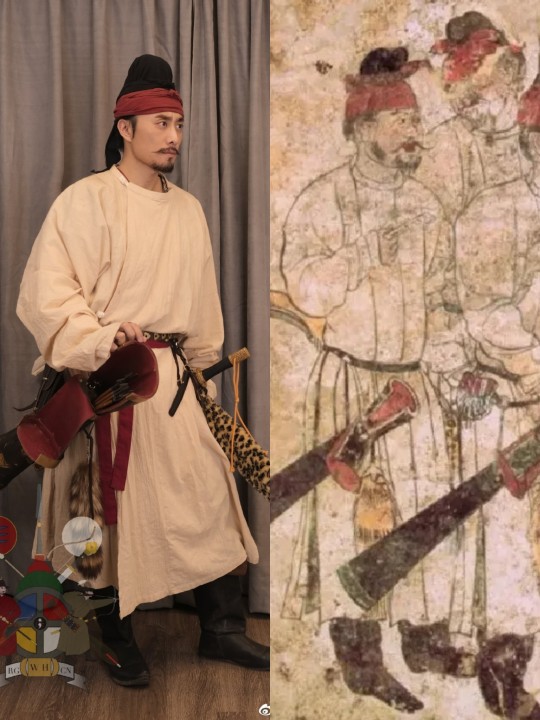
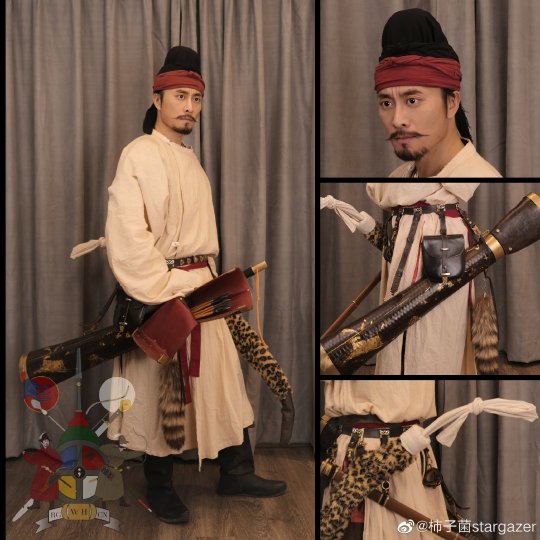



【Historical Reference Artifacts】:
China Tang Dynasty Crown Prince Zhanghuai Tomb(章懷太子墓)
Imperial Tang Royal Guard(AD 600 early period)

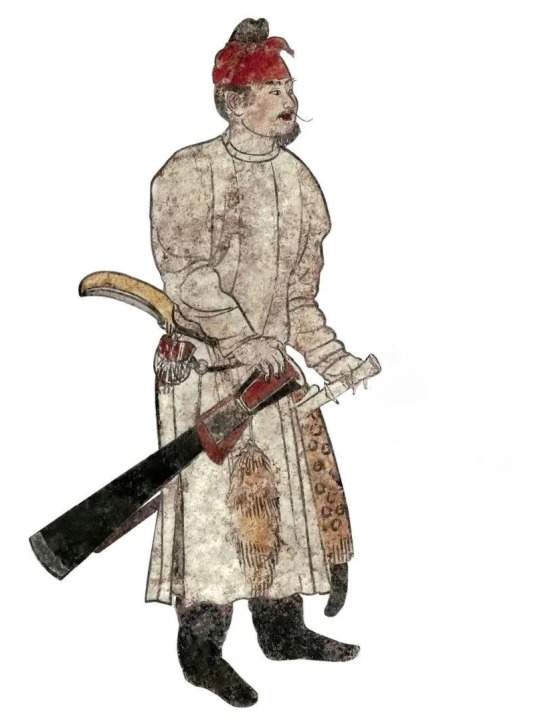
[Hanfu · 漢服]Chinese Tang Dynasty (960–1127 AD) Traditional Clothing Hanfu Based On Murals of Tang Dynasty 【Imperial Tang Royal Guard】
_________________
👨Recreation Work & Model:@柿子菌stargazer
🔗Weibo:
_________________
#chinese hanfu#Tang Dynasty (960–1127 AD)#hanfu#Imperial Tang Royal Guard#Tang Dynasty Crown Prince Zhanghuai Tomb(章懷太子墓)#hanfu history#hanfu accessories#hanfu_challenge#china#chinese traditional clothing#chinese#chinese historical fashion#chinese armor#man hanfu#yuanlingpao#foutou#柿子菌stargazer#汉服#漢服#中華風#圓領跑#幞頭
188 notes
·
View notes
Note
*peers in*
okay so we know Tang has fully read through and studied all aspects of journey to the west BUT
does he have a particularly favorite moment or chapter from the story?

Tang's favourite moment from Journey to the West?

Monkey notices a crowd standing around a guarded imperial edict as he gathers supplies in the capital city of the Scarlet-Purple Kingdom. The edict announces the emperor’s longstanding illness and promises to divide half his kingdom with anyone capable of curing his sickness. Sun takes this as an opportunity to flex his medical knowledge, and so he uses magic to take down the edict and, after initially framing Pigsy as the person who removed the document, the immortal is eventually introduced to the emperor by a crowd of officials. Tripitaka, who had traveled to the palace to get their travel rescript signed, is quick to admonish Monkey for falsely claiming to be a doctor, but the elder disciple assures his master that he has the skills necessary to cure the illness. Monkey, however, is forced to analyze the emperor from outside the royal bedchamber as the latter is too scared of the monk’s monstrous appearance. So he turns three of his tail hairs into three magical golden strings, each of which are attached to three specific areas on the emperor’s arm to measure his pulse. He ultimately determines the illness is caused by fear and anxiety over the loss of the ruler’s queen, who had been kidnapped by a demon. Sun requests the imperial doctors prepare three pounds each of eight hundred and eight different ingredients in order to keep his methods a secret. He then concocts three pills comprised of two herbs, a collection of pot soot scrapings, and a vial of magical dragon horse urine. The comically named “Elixir of Black Gold” (Wujin dan, 烏金丹) is administered to the emperor along with “sourceless water” (Wugen shui, 無根水), saliva gathered from Aoguang, the dragon king of the Eastern Ocean. The elixir causes the Emperor to pass an obstruction in his bowls, thus restoring the natural qi flow in his body and curing him of his sickness.

Now why this moment in particular? Because it showed the Monkey King was so much more than an “Impulsive, hot-headed warrior” or a “trickster” it showed how deeply Sun Wukong cared about others and showed him as a more than capable doctor able to do miraculous things if simply given the chance!!
4 notes
·
View notes
Text
Living with a Shih Tzu Dog: A Guide to Laughter, Laps, and Long Hair
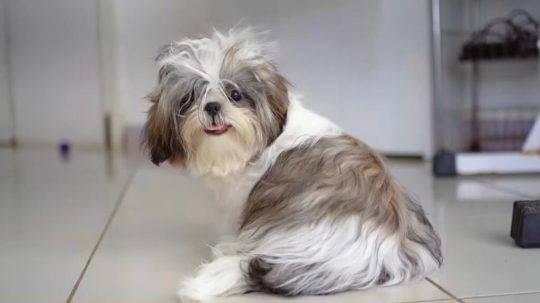
With lineage tucked into the chilly Tibetan mountains 2,000 years back, the signature double coat of the Shih Tzu dog was likely a cozy adaptation. Appreciated for their warmth, these mini creatures kept Chinese emperor’s toes toasty at bedtime. Bred by royal dog whisperers, the Shih Tzu’s roots are thought to weave together the Lhaso Apso and Pekingese.
Crossing the pond in 1928, they’ve since charmed their way into becoming one of the most popular toy dogs in the US and UK. Let’s dive into the unique aspects of the Shih Tzu’s realm.
Origin and Evolution
Evolutionary History
In conjunction with Shih Tzu origin, most evidence points to Tibet, where they’re bred by monks around 2,000 years back in time. As per some genetic studies, their strong relationships with the Lhasa Apso and Pekingese, proposing potential cross-breeding or shared root within ancient Tibetan “Lion Dogs.”
Shih Tzu, esteemed by Chinese emperors from the Tang Dynasty forward, were pampered palace residents, with the Dowager Empress Cixi (1861-1908) being a prominent patron.
Genetic Composition and Diversity
While some concerns are present pertaining to potential health issues interlinked with brachycephaly, studies propose moderate to high genetic diversity within the breed.
Environmental Adaptations
The Shih Tzu’s double coat, in the annals of time, an adaptation to the harsh Tibetan climate, now offers warmth and shield in distinct environments. The shortened muzzle of the dog can result in breathing difficulties in hot or humid weather. Concerning Shih Tzu adaptations, they’re astonishingly adaptable to different living situations albeit their royal heritage.
Distribution and Population
Geographic Range
When it comes to the Shih Tzu distribution, they sport immense popularity in the US, ranking in the top 20 most popular breeds as per the American Kennel Club (AKC) in 2023. Moving to Europe, the UK and France set the pace with significant Shih Tzu populations.
Notwithstanding the fact that the breed’s roots lie in China, they’ve conquered the hearts of dog lovers across Asia, with prosperous populations in Taiwan, Japan and South Korea.
Population Dynamics
Albeit these cute creatures aren’t the fastest-growing breed, their population has typically encountered a steady boost in recent years, mirroring their lasting popularity.
Types of Shih Tzu

Though major kennel clubs, like the American Kennel Club, recognize solely one breed of Shih Tzu dog, there’re distinct varieties with respect to size, coat color and markings. Let’s dig deep into the Shih Tzu’s types.
By Size
Standard Shih Tzu – the most common type of Shih Tzu, recognized by the AKC and weighing between 9 and 16 pounds. In addition, they measure about 9 to 11 inches in height.
Imperial Shih Tzu – not an official AKC breed – is a smaller version of the standard Shih Tzu, normally weighing less than 9 pounds and standing around 8 inches.
Teacup Shih Tzu – even smaller than Imperial Shih Tzus, weigh no more than 4 pounds and measure less than 6 inches in height. Nonetheless, owing to their small size, these the pups are most often than not prone to health problems.
By Coat Color
Solid-colored Shih Tzus come in a plethora of colors, such as black, white, brown, gold and brindle.
Bi-colored Shih Tzus possess two different coat color, including black and white, brown and white or gold and white.
Parti-colored Shih Tzus have three or more colors in their coat.
By Markings
Mask Shih Tzu: Some Shih Tzu varieties sport a darker marking on their face that’re identical to a mask.
Brindle Shih Tzu: These varieties have a coat with two or more colors that’re streaked or brindled together.
Piebald Shih Tzu: It has large patches of white on its coat, coupled with other colors.
5 Shih Tzu Facts
In Tibetan monasteries, Shih Tzu were in times past guard dogs.
Chinese emperors used to dote on these cute creatures, even sleeping parallel to them in elaborate “dog beds” within the palace.
The havoc of China’s 20th century just about wiped out these lovable friends. It were the dedicated Shih Tzu dog breeders who brought them back from the edge.
Their unparalleled jaw structure implies they smile even when grumpy!
The luxurious coat of the Shih Tzu dog may stun you, but it grows like crazy, making daily brushing essential.
Appearance

Physical Characteristics
Size: Speaking of the Shih Tzu size, they stand at 8 to 11 inches at the shoulder and weigh in at 9 to 16 pounds.
Shape: These compact and sturdy little dogs’ bodies are rather longer than they’re tall, with a level back and a rounded chest.
Coat: Concerning the Shih Tzu coat, undoubtedly it’s the most striking feature it has – the long flowing double coat. The luxurious fur of Shih Tzu dog showcasing a spectrum of colors, including black, white brown, red, bridle, gold and even parti-colors and tri-colors.
Life Cycles

Reproductive Biology
In line with other dog breeds, the Shih Tzu dog is seasonal breeder, generally coming into heat twice a year, approximately 6 months apart. This “heat” period – when female Shih Tzu are receptive to mating – persists around 18 to 21 days. In terms of Shih Tzu litter size, they produce 3 to 5 puppies in average. There's also a mashup of the Bichon Frise and Shih Tzu, giving rise to a cute teddy bear dog known as Zuchon.
Gestation Period
The moment breeding takes place, the magic of pregnancy takes hold. The Shih Tzu gestation period normally holds up around 58 to 63 days.
Life Cycle Stages
Neonatal Stage: At this stage, from 0 to 2 weeks, pups are holistically rely on their mother for milk and warmth.
Puppyhood: This energetic stage, from 2 weeks to 1 year, is characterized by swift growth, developing motor skills and learning social behaviors.
Adulthood: This is the stage, from 1 to 6 years, where these cute creatures touch physical and sexual maturity.
Seniority: When Shih Tzu age stepped into 6+ years, they become calmer and may entail less exercise. Nonetheless, they still crave affection and attention.
Shih Tzu Lifespan
This toy dog, renowned for its long, flowing coat and mischievous personality, enjoys a lifespan of 10 to 18 years. Astonishingly, a Florida Shih Tzu dog called Smokey holds the record for the oldest of its kind, having lived 23 years.
Shih Tzu Dog Diet

As for as Shih Tzu diet is concerned, they entail high-quality protein, healthy fats, and easily digestible carbohydrates to fuel their mischievous personalities. Here’s a dissection of the core nutrients:
Protein
Maintain approximately 25 to 30% protein content in their diet as it assists in building and maintain muscle mass, which is ultimately pivotal for keeping them active. Sources of protein can encompass lamb, chicken, beef, fish or eggs.
Fats
It’s the healthy fats that offer energy and let your Shih Tzu pet absorb needed vitamins and minerals. Aim for the Shih Tzu dog food that comprises omega-3 and omega-6 fatty acids – beneficial for coat and skin health.
Carbohydrates
Carbohydrates, undoubtedly, offer energy, but they should be confined in a Shih Tzu’ diet. Opt for intricate carbohydrates such as whole grains, sweet potatoes or brown rice over simple carbohydrates like corn syrup or white flour.
Cultural Significance and Symbolism
Since the Tang Dynasty (618-907 AD), their pampered lives infused them with regal symbolism in Chinese palaces. They’re regarded as guardians of the emperor’s fortune and happiness.
Honored in Tibetan monasteries, these toy dogs were thought to manifest the souls of monks. Their existence signified good luck and spiritual purity.
Shih Tzu as Pets

Temperament
In conjunction with the Shih Tzu temperament, they prioritize the cozy confines of home. They’re both stubbornly independent and affectionate, requiring attention with an endearing, if once in a blue moon insistent, charm. You’re to breed merely for companionship for they lack the instincts for guarding or hunting. The very undivided focus can reflect as a severe yearn for attention.
The irresistible urge to be a lap dog is among their conspicuous traits, basking in the warmth of human company. In addition, they’re relatively quiet – another delightful characteristic – making them adaptable to a plenty of living situations.
Maintenance
Speaking of the Shih Tzu maintenance, they entail regular baths for hygiene and comfort. Ensure a monthly bath or every 3-4 weeks, built upon their activity level. Notwithstanding the coat length, Shih Tzu grooming is pivotal on daily basis. The long-haired companions entail daily attention to prevent matting, while medium-length fur requires brushing every other day.
Exercise
Despite their energetic personalities, adult Shih Tzu are gratified with moderate exercise. They’ll readily frolic in the house or yard – their mischievous bursts fueled by daily walks. In terms of the Shih Tzu exercise, schedule two outings a day, each lasting 20-30 minutes to keep them physically and mentally fired up.
Training
Since their independent streak can surface later on, kicking off the Shih Tzu training early is essential. They’re most often than not titled “stubborn” in terms of housebreaking, so positive, consistent reinforcement techniques are key. Albeit they can learn striking tricks, note that they do march to the beat of their own drum. Here, enticing snacks can work wonders as motivators to make them learn new skills and master desired behaviors.
Care
The Shih Tzu adoption, certainly, brings immense joy, but also necessitates awareness – on the part of the owners - of their unparalleled needs, expressly Shih Tzu puppies. Their striking double coat demands regular brushing and grooming. Hold daily sessions with the right tools – consider fine-toothed combs and gentle brushes – to maintain that luscious fur.
Common Health Issues
Brachycephalic Syndrome: Owing to flat face, breathing difficulties, conceivably entailing surgery.
Eye Issues: Irritation from fur resulting in discomfort, treated with vet-prescribed eye drops.
Ear Infections: Recurrent due to floppy ears, needing regular cleaning and vet attention.
Intervertebral Disk Disease: Spinal issues frequent in toy breeds, affecting mobility.
Hypothyroidism: Thyroid disorder in middle-aged dogs, treated with medication.
Dental Problems: Higher tendency relative to other breeds, entailing consistent care.
FAQs
Are Shih Tzu aggressive?
Generally speaking, Shih Tzus are not hostile toward strangers or young kids. They are an adorable dog breed that is well-known for being gregarious, sociable, and loving.
Are Shih Tzu hypoallergenic?
Yes, they are as hypoallergenic as dogs come, because they don't shed much. With a Shih Tzu, people who are allergic to fur might be okay.
Are Shih Tzu smart?
Shih Tzus are generally thought of as intelligent dogs, and they have even helped craftsmen and farmers in the past.
Are Shih Tzu easy to train?
They are eager to learn new skills and are quite trainable, yet they pick up new skills far more quickly than their owners do.
Are Shih Tzu good dogs?
Shih Tzu are known for having lively, joyful dispositions. They are gregarious and energetic.
Can Shih Tzu eat banana?
Although they might be a nutritious supplement to a Shih Tzu diet, bananas shouldn't take the place of a well-balanced diet.
Read the full article
#shihtzuadoption#shihtzuage#shihtzuanatomy#shihtzubehavior#shihtzucare#shihtzucolor#shihtzudiet#shihtzudog#shihtzudogfood#shihtzufacts#shihtzulifespan#shihtzuorigin#shihtzusize#shihtzutemperament
0 notes
Text
Events 7.15 (before 1900)
484 BC – Dedication of the Temple of Castor and Pollux in ancient Rome
70 – First Jewish–Roman War: Titus and his armies breach the walls of Jerusalem. (17th of Tammuz in the Hebrew calendar).
756 – An Lushan Rebellion: Emperor Xuanzong of Tang is ordered by his Imperial Guards to execute chancellor Yang Guozhong by forcing him to commit suicide or face a mutiny. General An Lushan has other members of the emperor's family killed.
1099 – First Crusade: Christian soldiers take the Church of the Holy Sepulchre in Jerusalem after the final assault of a difficult siege.
1149 – The reconstructed Church of the Holy Sepulchre is consecrated in Jerusalem.
1207 – King John of England expels Canterbury monks for supporting Archbishop Stephen Langton.
1240 – Swedish–Novgorodian Wars: A Novgorodian army led by Alexander Nevsky defeats the Swedes in the Battle of the Neva.
1381 – John Ball, a leader in the Peasants' Revolt, is hanged, drawn and quartered in the presence of King Richard II of England.
1410 – Polish–Lithuanian–Teutonic War: Battle of Grunwald: The allied forces of the Kingdom of Poland and the Grand Duchy of Lithuania defeat the army of the Teutonic Order.
1482 – Muhammad XII is crowned the twenty-second and last Nasrid king of Granada.
1640 – The first university of Finland, the Royal Academy of Turku, is inaugurated in Turku.
1738 – Baruch Laibov and Alexander Voznitzin are burned alive in St. Petersburg, Russia. Vonitzin had converted to Judaism with Laibov's help, with the consent of Empress Anna Ivanovna.
1741 – Aleksei Chirikov sights land in Southeast Alaska. He sends men ashore in a longboat, making them the first Europeans to visit Alaska.
1789 – French Revolution: Gilbert du Motier, Marquis de Lafayette, is named by acclamation Colonel General of the new National Guard of Paris.
1799 – The Rosetta Stone is found in the Egyptian village of Rosetta by French Captain Pierre-François Bouchard during Napoleon's Egyptian Campaign.
1806 – Pike Expedition: United States Army Lieutenant Zebulon Pike begins an expedition from Fort Bellefontaine near St. Louis, Missouri, to explore the west.
1815 – Napoleonic Wars: Napoleon Bonaparte surrenders aboard HMS Bellerophon.
1823 – A fire destroys the ancient Basilica of Saint Paul Outside the Walls in Rome, Italy.
1834 – The Spanish Inquisition is officially disbanded after nearly 356 years.
1838 – Ralph Waldo Emerson delivers the Divinity School Address at Harvard Divinity School, discounting Biblical miracles and declaring Jesus a great man, but not God. The Protestant community reacts with outrage.
1862 – American Civil War: The CSS Arkansas, the most effective ironclad on the Mississippi River, battles with Union Navy ships commanded by Admiral David Farragut, severely damaging three ships and sustaining heavy damage herself. The encounter changed the complexion of warfare on the Mississippi and helped reverse Rebel's fortunes on the river in the summer of 1862.
1870 – Reconstruction Era of the United States: Georgia becomes the last of the former Confederate states to be readmitted to the Union.
1870 – Canadian Confederation: Rupert's Land and the North-Western Territory are transferred to Canada from the Hudson's Bay Company, and the province of Manitoba and the Northwest Territories are established from these vast territories.
1888 – The stratovolcano Mount Bandai erupts, killing approximately 500 people in Fukushima Prefecture, Japan.
0 notes
Text
Chinese Animation Recommendation List
This is a list of Chinese animated series that I personally enjoyed but which are lesser-known for Western audiences, and they mostly belong to wuxia/xianxia/fantasy categories. I hope whoever reads this can find something of interest from this list too! :)
1) 百妖谱 Fairies Albums (season 2 currently airing)

Fairies Albums is about the journey of a peach fairy, a baby monk and a snake demon, and the stories of other humans and demons they witnessed and involved themselves in along the way. The animation of this series may seem simplistic and there’re no exciting fight scenes, but it’s the story that really grabs my attention, and season 1 made me tear up basically every other episode. Fairies Albums is essentially about the emotional bond between people, and between humans and demons. The demons in Fairies Albums are, in a sense, purer creatures than humans, and act as a mirror to the good and evil, the greed and desires of the human heart.
2) 少年锦衣卫 Young Imperial Guards (2 seasons, both aired in 2017)
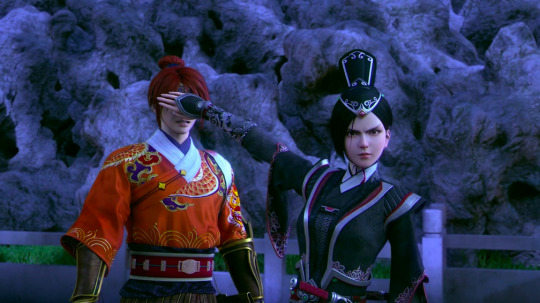
Young Imperial Guards is set in Ming Dystany (1368 to 1644 AD), much of the show is grounded in actual history and there isn’t really any fantasy element (but it doesn’t lack imagination, the Ghost Street in the show is just as colourful as the Ghost City in TGCF). The series has been praised for its smooth, well-paced and deft storytelling. Young Imperial Guards is quite typically about the bildungsroman of a bright but rash noble-born young man and the loss and political turmoil he faced (and there’re other interesting storylines). I feel like the show is structured around the long-standing dichotomy of the imperial court and “jianghu” (the martial arts world) in wuxia stories, and the choices that the characters make is often about which side they fight for.
3) 画江湖之不良人 The Degenerate: Drawing Jianghu (4 seasons complete, season 5 in production)

This is the show that Western audiences don’t know about but which I keep gushing over on my blog :P The show is set in the aftermath of the fall of Tang Dynasty - China became war-torn and fragmented, but the warlords and ambitious politicians saw it as a golden opportunity for themselves to rise up and grasp power. The main character turns out to be the last of the royal bloodline of Tang Dynasty (surprise surprise), and he needs to decide whether to face or evade the responsibilities and destiny of a royal family member.
This may sound a bit clichéd so far, but The Degenerate: Drawing Jianghu is so much bigger than the struggle of the main character. The show has long been praised for creating a wide array of interesting and memorable side characters, and their diverse and colorful personalities greatly added to the richness of the show. The overall tone of the first three seasons is quite dark and gritty, and doesn’t shy away from the cruelty of politics, of war, of jianghu itself, and especially the cruelty and tragedy of blighted and twisted human nature.
The first three seasons of the show sometimes tend to get lost in its own complexity and it’s a bit of a marathon to watch them all, so it would also be a good idea to watch season 4 only. Season 4 was written and directed by a different team and it's the best season so far in terms of animation and storytelling. (Season 5 and 6 are both out now and great!)
4) 少年歌行 Great Journey of Teenagers (season 2 currently airing)
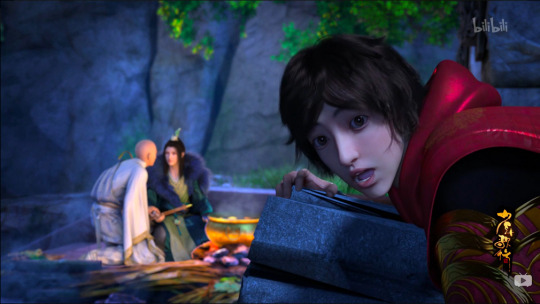
Great Journey of Teenagers is adapted from the novel of the same name, and I definitely have a quarrel with the official English translation of the title, because the original Chinese title is a lot more poetic and should be something like “Song of Wandering Youth”...Some would say that it’s a case of the adaptation being superior to the source material, and it’s overall a good show with interesting characters, emotional depth and some quite unexpected humour.
The show is about a group of young people trying to find their place in the martial arts world, about their friendships and romances, and the love stories of the older generation. And more importantly I feel like overall the story is about...trying to hold onto the people you love - sometimes one succeeds with it but sometimes one inevitably fails (ok this is my very personal interpretation).
5) 罗小黑战记 Legend of Hei (season ongoing, currently on hiatus)
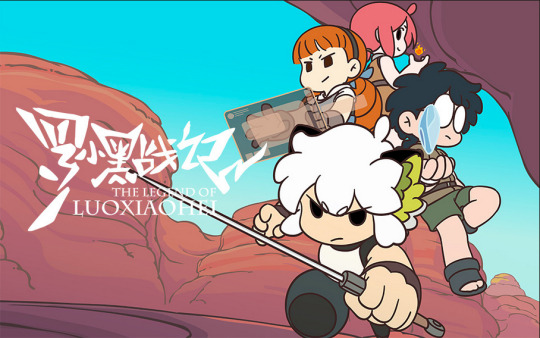
Legend of Hei is probably the most beloved Chinese animated series of the recent decade, and it’s the story of a little cat demon’s adventure in the modern human world. It’s created by a very small team and as you can see from the poster, the animation is very simple, but at the same time the director of the show pays a lot of attention to narrative and visual details, and that’s partly what makes the show good. Legend of Hei is imaginative, heart-warming, and funny, witty and quirky in a very refreshing way. There’s also a movie of the same name that serves as a prequel and a manhua series (which I haven’t read but should).
6) 眷思量 Island of Siliang (season 1 currently airing)

The animation of Island of Siliang is simply gorgeous, and for me that’s the main reason to watch this show. The premise of the story is that the gods who’re punished for their misdeeds are banished to an island called Siliang, where they’re trapped and live and age like mortals. The gods only have a chance to leave the island once every 500 years.
The pace of this show is pretty slow and the mysteries surrounding the island and its inhabitants are unfolded only bit by bit, which means that season 1 is only the very beginning. We have to wait for future seasons to learn more.
7) 天宝伏妖录 Legend of Exorcism (2 seasons complete)
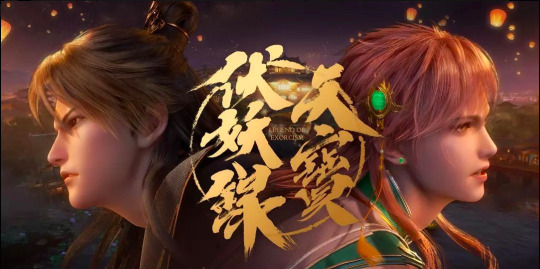
Legend of Exorcism is another beautifully animated show and it’s adapted from the danmei novel of the same name by 非天夜翔. The story is set in Tang Dynasty (618 to 907 AD) and it’s about the love story between Li Jinglong, a smart and conscientious army official who apparently doesn’t have very good luck, and Kong Hongjun, who’s half human and half demon and very cute and bubbly. The show deals with some serious themes of war and politics but overall it’s pretty light-hearted. If you like this show, you might also want to check out another animated series called Dinghai Fusheng Records, which is adapted from another danmei novel by the same author.
8) 两不疑 No Doubt in Us (season 1 currently airing)

No Doubt in Us is about an emperor and an empress who, by some magical mishap, swapped bodies with each other. The couple originally didn’t get along, but learned to appreciate each other more after they literally had to put themselves in each other’s shoes. So the show is ultimately about their love story. No Doubt in Us is unrealistic on so many levels besides the body-swapping part (man I wish politics in ancient China were this cute), but it is really fun and goofy and quite hillarious, and it has an interesting premise. So watch this show if you want light comedy with some court intrigues thrown in.
9) 雾山五行 Fog Hill of Five Elements (season 1 complete, season 2 in production)
youtube
Like Legend of Hei, Fog Hill of Five Elements is created by a very small studio, and the first season is really short with only three episodes. But it is a labour of love (I put the OP of the series here because it’s just beautiful). Fog Hill of Five Elements is essentially about the conflict between the human world and the demon world, and the consequences that humanity incurred when they immorally take advantage of the demons.
10) 灵笼 Ling Long: Incarnation (season 1 complete, season 2 in production)
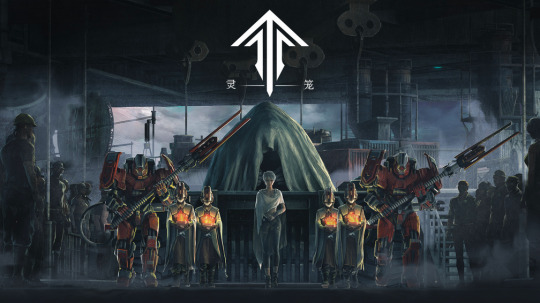
Ling Long: Incarnation is a post-apocalyptic science fiction series and it's often been hailed as god-tier by Chinese viewers. The animation is great and the story gets darker and more and more interesting as it progresses. The worldbuilding is complex and thorough and we’ve only seen the tip of the iceberg in season 1. What I love about this show is that it eventually goes beyond the “humanity fighting against apocalyptic zombies and monsters” narrative that pervades sci-fi of this kind, and it’s ultimately about bridging and merging the human and the monster and using such hybridity as a way to survive and understand the post-apocalyptic world. (ah I feel like I’m writing an academic essay here because I study science fiction...)
And finally,
Where to Watch Them:
I believe all the shows can be watched for free on the animezone247 website , but the quality of the English subtitles can’t always be guaranteed.
Fairies Albums, Legend of Exorcism, and No Doubt in Us can all be found on the official YouTube channel of Bilibili (although I think you have to pay to watch the first season of Fairies Albums). Season 2 of Great Journey of Teenagers is on the official YouTube channel of Youku Animation. These should all be easy to find on YouTube. I’m pretty much a computer illiterate, so I bet people can find better places out there to watch these shows haha.
599 notes
·
View notes
Text
Chapter 60-61: Tang Fan Gets Blisters on the Insides of His Thighs, Sui Zhou Asks Him to Take Off His Pants
Context: Sui Zhou and Tang Fan (and their respective teams) embark on their journey to He Nan Province. Tang Fan ended up having to bring along Yin Yuan Hua, one of the officials in Tang Fan’s department who he bested, and whose supervisor/shifu in the same department Tang Fan offended (for good reason!). Yin Yuan Hua’s mission on this trip is to gather evidence of Tang Fan’s wrongdoings/mistakes so he can go back and report him to higher-ups, and hopefully this will end in Tang Fan’s demotion.
Also a Note: I’m doing the first half of 61 for context (because the case is pretty complex plus all the new characters lolol) and the second half of 61 where the cute fanzhou moments are, but from now onwards Tang Fan and Sui Zhou are hanging out with each other like 24/7
AMAZING TIDBITS:
Pants stripping
Sexual innuendos
Tang Fan and his tongue licks Sui Zhou’s finger
Sui Zhou feeding Tang Fan pastries
Fanzhou shares a bed XD
Introduction Post | Masterpost
—
Highlights under the cut
Tang Fan and the rest of them set off from Jing City, and head in the direction of He Nan Province on land.
Sui Zhou left Xue Ling back in the Northern Administrative Court to hold the fort, and he himself, along with Pang Qi included, brought along 20 close guards. With Tang Fan, they head south, tasked as an imperial convoy.
Although this case is hardly the most urgent, it involves the life and death of others and also the robbery of royal and imperial tombs, so there is no time to waste. Everyone began the journey riding horses, but after rushing on the roads for two days, the disparity between the Embroidered Uniform Guards and civil officials slowly became increasingly visible.
The guards are a bunch of brash old men and have thick and tough skins. Moreover, after going through Sui Zhou’s hellish training, all of them have already been polished into people with bodies and bones of steel. That being said, even without Sui Zhou’s intensified training, for army officials like them, riding horses and rushing along is a simple thing to them.
The same cannot be said of civil officials, however. These officials spend most of their days in the courts and the hardest manual labour they have done is at most serving tea. Suddenly having to ride horses for two days consecutively, it feels as if their bodies and bones are about to fall apart. And what they could not say was that every one of them had blisters on the inside of both their thighs, and some of these have already burst and are bleeding. They hurt like burns.
As the formal lead envoy, Tang Fan of course has to act like the leader he is and grit his teeth in determination regardless of the circumstances. It does not take Sui Zhou long to discover that these civil officials can no longer go on, and orders the guards to slow down their pace. He also quickly takes out some ointment for Tang Fan and the rest to use on their wounds.
Since their leader can withstand this, the two officials under Tang Fan naturally are in no place to complain. Instead, it is Yin Yuan Hua who insists on not riding horses anymore and demands that they switch to a horse carriage.
The Embroidered Uniform Guards do not look upon these civil officials kindly, but they also know that their Sui-laoda has a good personal relationship with Tang Fan, and it is rumoured that this formal lead envoy is staying right in Sui-laoda’s house.
This Yin Yuan Hua, on the other hand, is obviously not on good terms with Tang Fan, and this is easily seen when he speaks with Tang Fan, and even when he does not speak. Both of them are not on the same side, and the guards do not dare to mock the formal lead envoy, so naturally, they focus their attention and provoking remarks onto Yin Yuan Hua instead.
One of them wriggles his eyebrows, “Aiyo, someone thinks he’s out here to sightsee, and wants to even sit on a horse carriage? Does he also want a beaded curtain? Like those esteemed ladies, or wives, when they hide half their faces, and are embarrassed even before they speak!”
Another laughs snidely, “How do you know if he isn’t a little wife? Don’t tell me you’ve seen what he looks like without clothes on?”
Earlier, their group passed by a official’s relay post, and decided to stop for a rest. Tang Fan and Sui Zhou are formal lead and co-lead envoys, and wanting to interact freely, they are unwilling to share a table with their leaders even at meals, and so Sui Zhou and Tang Fan have a table to themselves. Yin Yuan Hua and the two civil officials share another, and the rest of the guards are scattered around. So once the next table speaks, Yin Yuan Hua can hear them extremely well.
How would he not know that these people are speaking about him? Fury courses through him immediately and slamming his chopsticks on the table, he gets to his feet and says, “Who are you talking about!”
It would have been better if he did not stand up, because once he gets to his feet, his thighs cramp up immediately, sending Yin Yuan Hua into unbearable pain, and this garners the mockery of the group of guards.
Although Tang Fan doesn’t think much of Yin Yuan Hua, but on this trip, he is formal lead envoy and is also Yin Yuan Hua’s supervisor. As a leader, he needs to have the aptitude of one and so he cannot just stand by and let Yin Yuan Hua be mocked like this. He uses the other end of his chopsticks and pokes at Sui Zhou’s arm.
Sui Zhou lightly coughs and his sharp gaze sweeps over his group of men, and they immediately stop laughing, burying their heads into their rice and meal.
After their meal, Yin Yuan Hua insists on not riding horses, wanting to sit on a horse carriage and head to He Nan.
Both of the other civil officials are also suffering silently, and so turn their hopeful eyes onto Tang Fan.
With a strange expression, he asks, “All of you really want to sit on a carriage?”
The officials do not dare reply, and Yin Yuan Hua interjects, “We must have a carriage. We lower-ranked officials cannot compare to daren, we don’t have to deal with the pressure which comes with the formal lead envoy position. Comfort is of importance, and we’re not afraid of being mocked by others!”
In his words is hidden mockery at Tang Fan bringing suffering upon himself, all to salvage his pride.
Tang Fan says, “We may not have enough horses at the next relay post, so once you switch to a carriage, if you regret it, you will still have to sit in it until we reach He Nan.”
The more he says, the more Yin Yuan Hua feels that Tang Fan is deliberately making things difficult for him, and so insists on sitting in a carriage and nothing else.
He has already said this much and given them a friendly reminder, but they will not listen, so there is nothing to do but to let them have their way. He asks the official in charge of the relay post to prepare the horse carriage.
The carriage itself is still considered quite spacious and has enough space for Yin Yuan Hua and two other officials to sit in. The official also found a driver for them, and once the carriage reaches its destination, it is just nice for the driver to return with it.
The three of them happily get on the carriage after seeing that the insides are padded with cushions, and this is definitely more comfortable than riding the horses.
In the end, just after they crossed several kilometres, Yin Yuan Hua and the rest suddenly realise why Tang Fan revealed that indescribable expression earlier after they insisted on sitting in a horse carriage. Because this is even more shaky and turbulent than riding a horse…
Yin Yuan Hua regrets as he finally gets a taste of what it means to strike his own foot with a rock he’s moving.
Not only just him, but both Cheng Wen and Tian Xuan, are regretting their decision immensely.
It is such a turbulent journey, and just before their souls are shaken out of their cores, they finally arrive at Gong County.
Before the group of them arrived at Gong County, the county’s magistrate had already brought his men out to the official relay post right next to the official’s travel channel early on to wait for them.
“Daren, how about you come in and rest your feet?” the county deputy, who has also come out to welcome the group, cannot help but ask the magistrate, who is pacing back and forth so much it’s making him dizzy.
Aside from the deputy and other officials, which include both low and high ranking ones, plenty of other well-known gentlemen also wanted to accompany them originally, but were all rejected by the magistrate. He is facing so many cases right now, how would he have any more energy to bring these people along and let them create trouble in front of him?
Before his trustworthy deputy, the magistrate does not hide his face full of worry, “Hai, laodi ah, it’s not like you don’t know, these envoys are not here to sightsee, they’re here to investigate a case. At the end of the day, trouble happened to the imperial tombs within my jurisdiction, and if we don’t handle this properly, I will not be able to keep this futou of mine!”
The deputy advises, “Daren, it is futile for you to be frustrated about this, you might as well cooperate well with the envoys, and then ask them for a favour so they can go back and help put in a good word for you, who knows, this huge matter may turn into a small one!”
The magistrate sighs, “That’s all I can do at this point. I’m such an unlucky magistrate, the former magistrate and the one before him left a huge mess of things when they passed on their positions, and the imperial tombs were left untouched, but these messes I still had to deal with! No one knew of my efforts, and now that the imperial tomb is involved, the responsibility for this has instead fallen onto my head!”
Which official has not been dragged into one or two terrible events, thinks the deputy. How is it possible for an official to have a smooth career all his life, it is the magistrate who was afraid of trouble in the first place, and now he is complaining about this instead of thinking about how to properly suck up to the incoming imperial envoys. What future can he count on like this?
Unfortunately he is the man’s subordinate and although these are his true thoughts, he still ends up properly reassuring his magistrate.
In the midst of their conversation, a group of men and horses approach from the distance and gradually slows down, the dust picking up around them, and behind, it looks like there is a horse carriage accompanying the group as well.
The magistrate and his deputy head out, and a minor official comes over with news, saying that the people ahead are indeed the imperial envoys.
“Quickly accompany me to fetch them!” the magistrate says, adjusting his uniform and hat.
The speed of the horse carriage is not fast and Sui Zhou’s subordinates in front seem to have deliberately slowed down to wait for the carriage at the back, and only after a minute or so does the whole group, which was already visible from a while ago, arrive.
Right in the middle of the other Embroidered Uniform Guards, a young man wearing a Rank Five uniform and an Embroidered Uniform Guard wearing a feiyu uniform are surrounded.
The magistrate quickly approaches them and offering both his hands in greeting, he says, “Gong County Magistrate He Hao Si greets the imperial envoy!”
Although he is unsure who is actually the formal lead envoy, but this greeting will certainly do no wrong.
The official document sent by the Department of Justice also clearly says that the lead envoy is the department’s overseeing langzhong in Henan’s Qing Li Si, Tang Fan, and the co-lead is the Embroidered Uniform Guards’ acting zhen fu shi, Sui Zhou. However, since both lead and co-lead envoys are here, then who is the one sitting in the horse carriage at the back?
Could it be an even more important person?
Magistrate He cannot help but look towards the back.
Instead, he sees the Embroidered Uniform Guard next to the civil official move backwards a little to put some distance between them, indicating the difference in status between him and the civil official. He opens his mouth and affirms Magistrate He’s guess, “This is Henan’s Qing Li Si langzhong, Tang-daren, and he is the formal lead envoy.”
Tang Fan wearily gets off his horse and returns Magistrate He’s greeting, “Magistrate He does not need to stand on ceremony, we have been on the roads for days, shall we first find a place to sit and talk?”
“Yes yes yes!” Magistrate He returns to himself, and hurriedly says, “This official has already readied the relay post, and also asked them to prepare food and hot water. I’d like to ask everyone to move into the city, it is not far away from here.”
Tang Fan nods, “Then I’ll have to trouble Magistrate He to show us the way.”
***
“Come over here.”
Tang Fan takes a look at the ointment in his hands, and cannot help but laugh, the sound dry, “You see, I’ve used the bandages for so many days, it’s almost healed, so I don’t need to put it on anymore, it’s uncomfortable!”
Sui Zhou’s face is cold, “Come over when I tell you to come over, whether or not it has healed, wouldn’t you know best?”
Of course he has not yet healed.
Tang-daren’s face falls, and he slowly ambles his way over.
“Lie down, take off your pants and pick up your shirt.”
“…”
No matter the circumstances, this conversation sounds only too intimate, and if anyone were to pass by on the outside, it’s likely they will misunderstand, but the reality could not be further from that.
Tang Fan’s physique is not much better than Yin Yuan Hua and the rest, and he has ridden on a horse for so many days consecutively. Naturally, he is unable to withstand this, but sitting in a horse carriage is worse, and he knows that just by seeing the way Yin Yuan Hua threw up. In comparison, it is only his butt and the sides of both his thighs that hurt riding the hose, and not his whole body. Weighing between both to see which is more important, as the biggest lead in this mission, Tang-daren would rather suffer than lose all pride like the way Yin Yuan Hua did.
This is called suffering as one would rather die than lose pride and face.
The posterior is one thing, as it is shaken here and there; the area is a bit thicker, so it doesn’t matter as much. The main thing is the insides of his thighs, which has been subjected to endless friction and movement in contact with the horse. Blisters formed, and then bled when the skin was broken through.
It is a must to put some ointment on if he is hurt, and in the beginning, Tang Fan was worried of losing face, too embarrassed to ask for help, until Sui Zhou forcibly restrained him to put the medicine on.
Now, having to put on a fresh round of ointment every night has become something that Tang-daren is most reluctant to do.
If he could choose, he figures he would rather go to the Luo River and warmly face the River God there, than to lie flat on the bed like this with both legs spread open, his pants taken off and his shirt picked up, letting Sui Zhou change the bandages around his injured parts.
Although they are both men and the parts he should have, he has, and the parts that he should not have, he does not have, but Tang Fan just feels incredibly uncomfortable. Staring at the ceiling above him, he disassociates, only to hide his embarrassment.
Sui Zhou seems to be able to see through his thoughts and finds it really hilarious inside, but on the surface, he retains his stoicism. Circling the bandage around Tang Fan’s legs, he pretends to accidentally brush his eyes past Tang Fan’s groin, peering at it for a moment, before saying, “The form is not bad.”
Even though Tang Fan is pretending to be dead, he is still conscious and attentive, and the moment the other’s words sound in his ears, he cannot help but go red in both his face and ears, and furious, he says, “How dare you, assessing the lead envoy like this, do you not want to live anymore?”
Sui Zhou goes ‘oh’, and then, “I am an envoy too.”
“You’re a co-lead, and I am the lead, cut out the nonsense, you should strip and let this official assess yours as well!”
Sui Zhou, “You are certain you want to see?”
“Of course!”
He thought Sui Zhou would come up with an excuse to refuse, but who knew the other simply stands up without another word, and reaches out to loosen his trousers belt.
Tang Fan hurriedly says, “ Forget it, forget it, I know you’re smaller than me, if your ego takes a hit later this is not good, all men want to save face, so I will go easy on you this once.”
“No matter, I do not mind,” Sui Zhou returns.
“…”
Sui Zhou only wants to tease Tang Fan, he is not this despicable. And seeing that Tang Fan is about to explode in anger, Sui Zhou goes with the flow and stops. He brings a plate of pastries over from the table, picks up one, and personally brings it to Tang Fan’s mouth.
Under the dim glow of the candle light, Tang Fan cannot see the shape of the clear jujube cake, but the flavour as it enters his mouth is extremely good. Sour and sweet, and for a moment, it is a familiar taste to him, similar to the one the cooking lady at home made when he was younger.
He cannot help but curl his tongue, reaching for the rest of the pastry piece, only to sweep across Sui Zhou’s finger accidentally. The other freezes slightly, and snatches his hand back quickly.
Tang Fan does not take this to heart, and instead squints as he fully savours the flavours on his tastebuds. He nods, and praises, “The pastry that Deputy Zhao chose is really not bad! It is a pity this place is filled with evil, and such good pastries are wasted here. We may have to start rushing about sometime in the middle of tomorrow night!”
Sui Zhou gets him to wear his trousers properly, and bends down himself to adjust the bedsheets and covers. He asks, “You saw something amiss?”
Tang Fan shoves another piece of jujube cake into this mouth and instead of answering him, responds with a question, “You can see it too?”
“Don’t eat too much, or you won’t be able to sleep later,” Sui Zhou frowns and nags. Then, “That old man seems suspicious.”
Tang Fan nods, and opens his mouth, about to speak, but because the cake slides into his throat, he ends up almost choking to death. He brings his hand up, holding onto his throat and the whites of his eyes can be seen.
Exasperated, Sui Zhou goes over to pat at his back, then gives him a cup of tea, “How did you actually survive the past twenty years?”
Drinking the tea and sending the cake down along with it, Tang Fan finally heaves a sigh of relief before laughing, “A menace like this official will naturally be alive for a thousand years. That old man is indeed suspicious, and although he seems incoherent when speaking, it does look more like his behaviour is deliberate.”
Sui Zhou makes a noise of assent, waiting for him to continue.
“There are a few possibilities. Firstly, those people were killed by the old village chief, but this isn’t very likely. I can’t think of a reason why he would kill all these people. Besides, he is a weak elderly, so unless he had some help, it is impossible for him to harm so many people. So let’s set this possibility aside for now.”
“Second, that old man, or even the whole village, are in cahoots with the tomb raiders, and are doing all they can to mislead us, directing us to focus on the possibility of a malevolent ghost. Maybe after the robbers raided the imperial tomb, they promised to distribute some of their loot to the villagers in exchange for their help in keeping this a secret. The people who were killed discovered this, and wanted to report them.”
Tang Fan slowly analyses that hypothesis, then shakes his head, “But this is not fully explainable. The clues that we have on hand are too little, it is very difficult to guess what the truth is.”
“There’s still one more possibility,” Sui Zhou says.
Tang Fan looks at him, and he continues, “What the old man said is true.”
“You believe in ghosts too?”
Sui Zhou shakes his head, “It might not be a ghost, but it could be something else. Whether the old village chief has truly gone insane or is pretending to be, he is definitely hiding something from us, and has not told us everything.”
Tang Fan laughs, “We tried the civil, courteous route first, and next can bring out the troops. It looks like we have to get the Embroidered Uniform Guards to take over.”
In terms of interrogations and forcibly getting confessions, there is no other group of people more adept at this than the guards. When people hear of interrogations, they often think of cruel torturous methods, but in actual fact, a lot of other methods exist in this world which will make one obediently vomit out the truth without any physical torture. These methods are most commonly used on officials who refuse to speak the truth and yet cannot be subjected to torture; a secret that is passed only within the guards and is unique.
Using it against an old man in a poor and removed village, is considered using a blade that is made for slaughtering cows, to slaughter a chicken.
Sui Zhou says, “We’ll talk tomorrow and rest now.”
Yes, it is almost the hai hour (9-11pm), and they naturally must rest.
It is quiet outside, not even the slightest sounds can be heard from livestock or dogs, and all living creatures have also descended into sleep. Saying it is entirely silent, however, is not correct. At the very least, the Luo River which is a short distance away continues to flow, day or night. The rush of water charging forth fills up their ears, but once one gets used to listening to this, it does not bother them much. Instead, it almost feels as if their troubled thoughts are being scrubbed clean by the river.
The bed space is not cramped or narrow, and is more than sufficient for two people to lie on it. Tang Fan sleeps on the inside, and Sui Zhou sleeps on the outside.
Although the both of them stay under the same roof, they have never slept shoulder to shoulder like they are doing today, previously. The both of them are really too tired, but sometimes, when one is too exhausted, it is instead more difficult to fall asleep.
Sui Zhou hears Tang Fan’s tossing and turning and says, “Turn over.”
Tang Fan does not ask why and turns over so his back is facing the other, and then he feels a warm palm cup over his jaw. Another hand slowly presses at a few acupuncture points at the back of his head.
The tension in his brain dissipates gradually, and Tang Fan moans once, comfortable. The person behind him is applying just the right amount of force, not too light, and not too heavy. He feels the pull of slumber come up as the exhaustion emerges again, and quickly enter the land of dreams.
In the middle of the night, he has a strange dream.
In it, he is walking along the dark river banks and in the vast land in the distance, many tombstones, high and low, have been erected. The wind blows past him, and along with it brings the sound of cries. The cries are devastating, as if filled with endless suffering, pain and resentment. The sound echoes in the space and then digs into Tang Fan’s ears, sending shivers down his spine.
The cries approach, coming closer and closer, closer and even closer, and suddenly, it seems like there is something behind him! The sensation is unclear to him, all he knows is that he has never felt this afraid before.
Slowly, he turns his head, and jolting, he opens his eyes.
“Don’t move,” Sui Zhou says, his voice low next to his ear, his arm stretching across Tang Fan’s waist.
Hearing his voice, the heart that was racing because of his nightmare slowly calms.
Then he quickly realises that the intolerable wails does not seem to exist just in his dreams, but is originating right from outside!
===
Notes:
*乌纱帽 wu sha mao
Also commonly called a 乌帽 (wu mao) or futou, this is the headwear for Ming dynasty officials, with a tall cylindrical top and two flaps on the sides.
*河南清吏司郎中 he nan qing li zi lang zhong
This is a full official rank. It is a little hard to find an English equivalent to this on my end so I’ve left it as that. 河南 (he nan) is a city all on its own in today’s map, and in this case it means Tang Fan is heads this particular court located in he nan. I’m not really familiar on the geography of it as well, it could just be a name for the neighbourhood or sector he’s in as well.
*镇抚使 zhen fu shi
Another official rank, where 镇抚 (zhen fu) is the Administrative Court, and 使 (shi) on its own means ambassador. In this case, it can be interpreted as chief, or some equivalent. He is not a commander yet in this case, which is a position reserved for Yuan Bin, and previously Wan Tong.
*搬起石头砸自己脚 ban qi shi tou za zi ji de jiao
This means literally to pick up a stone and smashing your own foot with it, which means inadvertently and directly causing harm to yourself with a decision you made. I left the metaphor in the translations above because it’s interesting, the imagery!
*祸害遗千年 huo hai yi qian nian
This is a common phrase used to say that a menace or evil being will survive for thousands of years, and good people are doomed to die early in a second part to this phrase.
*杀鸡用牛刀 sha ji yong niu nian
Literally means to use a blade for slaughtering a cow to kill a chicken, which also means to apply unnecessary and excessive force to a matter which requires minimal effort. Or going overboard when the matter or thing requires much lesser force.
#the sleuth of ming dynasty#tsomd#成化十四年#cheng hua shi si nian#fanzhou#suitang#sui zhou#tang fan#tsomd novel#novel translations#this is definitely one of the chaps i like more hahaha
80 notes
·
View notes
Text
Rise of Sixteen States: 304
This year there were many affairs.
Liu Yuan declares himself King of Han.
Li Xiong declares himself King of Chengdu
22 February 304 – 10 February 305
(Jin's 1st Year of Yongxing)
(Han's 1st Year of Yuanxi)
(Chengdu's 1st Year of Jianxing)
3rd Month, wushen [1 May], used the King of Chengdu, Ying as August Brother-Heir and Commander-in-Chief of All Army Affairs in the Centre and Outside, and Assisting Chancellor.
7th Month, bingshen, New Moon [17 August], the General of the Guards of the Right, Chen Zhen, used a decree summoning the hundred companions to enter within the hall, and following that directed troops to punish the King of Chengdu, Ying.
On jihai [20 August], the Minister over the Masses, Wang Rong, the King of Donghai, Yue, and others served the Emperor on a northern campaign. They arrived at Anyang with a multitude of 100 000. Ying dispatched his general Shi Chao to resist them in battle.
On jiwei [9 September], the Six Armies were defeated at Dangyin. Arrows reached the Driving Carriage, the hundred officials divided and scattered. The Emperor that evening favoured Ying's chariot, the next day he favoured Ye.
8th Month [16 September – 15 October], the General who Calms the North, Wang Jun, dispatched Wuwan cavalry to attack the King of Chengdu at Ye, greatly routing him. Ying drove with the Emperor in a single chariot to flee to Luoyang.
11th Month, yiwei [14 December], Zhang Fang coerced the Emperor to favour Chang'an.
The King of Hejian, Yong, led public officials and 30 000 infantry and cavalry to welcome [the Emperor] at Bashang.
(Liu Yuan)
The King of Chendu, Ying, became August Brother-Heir. He used Yuan as Colonel of Garrison Cavalry to the Brother-Heir. Emperor Hui attacked Ying, and stayed at Dangyin. Ying made use of Yuan as General who Assists the State and Commander-in-Chief of the Defence Affairs of the Northern City. When Emperor Hui had been defeated, he used Yuan as General of the Best of the Army, ennobled as Earl of Lunu. Soon after, the Inspector of Bing province, the Duke of Dongying, Teng, and the General who Calms the North and Inspector of You province, Wang Jun, raised troops to attack Ying. Ying's host fought and was defeated. Yuan spoke to Ying, saying:
Now the two garrisons trample on restraint, with a multitude exceeding 100 000. [I] fear we will not be able to manage them with the personal guards and the nearby commanderies' gentlemen and people. Yuan will, Your Highness, return to explain to the Five Sections, assemble and gather a righteous multitude, and thereby hasten to the state's difficulties.
Ying said:
The multitudes of the Five Sections, can they protect and set out already or not? Allowing for you being able to send them out, the Xianbei and Wuhuan are strong and quick like the wind and clouds. How easily can it be done? I wish to serve the Driving Carriage and return to Luoyang, and avoid their spear points, calmly summon Under Heaven to arms, and govern them according to their opposition or loyalty. Lord, what are your thoughts?
Yuan said:
Your Highness is the son of the Martial August Emperor, and has special merits in the royal house. Your power and kindness shine in harmony, the Four Sea's reverent wind. Who would not consider to lose their lives and throw down their bodies for Your Highness? What is the difficulty in sending them out! Wang Jun is an upstart son and Dongying a distant cousin, how could they contend equally with Your Highness?
If Your Highness goes out alone from the Ye palace, and shows weakness to people, is it possible then to arrive in Luoyang? Suppose you reach Luoyang, power and authority will not be restored to Your Highness. A paper calling to arms is a foot-long letter, who will the person be who receives it!
Moreover the Eastern Hu's courage does not exceed the Five Sections. [I] wish Your Highness would encourage and console the multitude soldiers, calming them down and thereby quell them. [I] will, Your Highness, use two sections to destroy Dongying and three sections to put on display Wang Jun. You can point to the day when the heads of the two upstarts will be hanging up.
Ying was pleased and designated Yuan as Northern Chanyu, Assisting the Army Affairs of the Imperial Chancellor. Yuan arrived at Zuoguocheng. Liu Xuan and others elevated him to the title of Great Chanyu. Within twenty days the multitude was soon 50 000. He set his capital at Lishi. He dispatched the Yulu King of the Left, Hong, to lead 5 000 elite cavalry and meet up with Ying's general Wang Cui and resist the Duke of Dongying, Teng. But Cui had already been defeated by Teng, so Hong returned back with nothing done.
Wang Jun sent General Qi Hong to lead Xianbei and attack Ye. Ying was defeated, and held onto the Son of Heaven to run south to Luoyang. Yuan heard Ying had left Ye, he sighed and said:
Ying did not employ my words, on the contrary he is himself running from disaster. He truly has menial talents. However as I and him had words, I cannot but aid him.
Hence he instructed the Yulu King of the Right, Liu Jing, and the Dulu King of the Left, Liu Yannian, and others to lead 20 000 infantry and cavalry, and commanded them to punish the Xianbei. Liu Xuan and others firmly remonstrated, saying:
Jin is without the Way, slaves and lackeys govern us. Therefore the Worthy King of the Right's fierceness does not surpass his anger. Just now Jin's guide ropes are not spread. [If] the great affair is not followed through, the Worthy of the Right will smear [himself] with earth, to the Chanyu's shame.
Now in the Sima clan, father and son, elder and younger brother, are themselves [chopping] each other [like] fish meat, this is Heaven casting aside Jin's virtue and conferring it on us. [If] the Chanyu stores up virtue in his body, and is submitted to by the people of Jin, [he] soon will raise up our nation and tribe and restore the patrimony of Huhanxie. The Xianbei and Wuhuan are of our manners and type, and could be used as helpers, why would [we] resist them and aid [our] foes!
Now Heaven is acting through us and cannot be disobeyed. To disobey Heaven is not auspicious, to go against the multitudes is not helpful. [He who when] Heaven gives does not take, will in turn receive his calamity. [I] wish the Chanyu would not doubt.
Yuan said:
Good. [I] will be raising up the hill to the pinnacle mound, why would I make a hillock! As for Emperors and Kings, when where they regular? Yu the Great was born among the Western Rong, King Wen was born among the eastern Yu. Looking back, they were conferred for virtue, that was all. Now [I] see a multitude of more than 100 000, and anyone of us is a match for ten of the Jin. To strike the march and destroy chaotic Jin is like snapping deadwood, that is all. At best I can complete the legacy of Gao of Han, at worst I will be no less than the Wei clan. How is Huhanxie a sufficient course of action!
However, the people of Jin are not necessarily similar to us. Han had Under Heaven for many generations, kindness and virtue connection to the population's hearts. Thus though Zhaolie [lived] rough and rugged in the lands of a single province, he was yet able contend at an equal level Under Heaven. I am also a sister's child of the Han clan, sworn to be elder and younger brothers. When the older brother perishes, the younger carries on. Can we not do likewise? Now moreover, I can raise up Han, posthumously honour the Later Ruler, and thereby comfort the populace's expectations.
Xuan and others touched head to ground, saying:
[They] are not reaching up [to you].
1st Year of Yuanxi [304 AD], he moved to Zuoguocheng. The Jin people who [came from] the east to adhere were several ten thousand. Xuan and others sent up [to assume] the venerated title. Yuan said:
Now the Jin clan still exist, the Four Regions are not yet settled. [We] can look up to and honour the Exalted August's first regulations, and moreover designate [me] King of Han [while] for the moment delaying the tile of August Emperor. [When I] hear the cosmos is mixed into one [I] will once more discuss it.
10th Month [14 November – 10 December], he had an altar in the southern suburbs, and falsely ranked as King of Han. He sent down an order, saying:
Formerly our Grand Founder [taizu], the Exalted [gao] August Emperor used his divine martial ability to follow expectations, and broadly began the great patrimony. The Grand Ancestor [taizong], the Filial and Civil [xiaowen] August Emperor gave weight to using enlightened kindness, peace and prosperity was the Way of Han. The Generational Ancestor [shizong], the Filial and Martiaizul [xiaowu] August Emperor expanded the territory and repelled the yi, the territory exceeding the days of Tang. The Middle Ancestor [zhongzong], the Filial and Propagating [xiaoxuan] August Emperor, sought and lifted up the capable and outstanding, many scholars filled the court.
Hence the Way of our founder and ancestors strode pass the Three Kings, their achievements exalted as the Five Emperors. For that reason the foretold years were many times the Xia and Shang's, the foretold generations exceeded the Ji clan. But Yuan and Cheng had many crimes, Ai and Ping were briefly blessed. The traitorous subject Wang Mang overflowed Heaven and usurped disobediently.
Our Generational Founder [shizu], the Brilliant and Martial [guangwu] August Emperor was expansively endowed with sagely martial ability. He immensely restored the vast foundation, worshipped Han matched with Heaven, and did not neglect old matters, so that the Three Luminaries' obscurity were yet restored to clarity, the Three Receptacles' darkness were yet restored to visibility. The Manifesting Ancestor [xianzong], the Filial and Enlightened [xiaoming] August Emperor, and the Solemn Ancestor [suzong], the Filial and Articulating [xiaozhang] August Emperor, amassed eras, the blazing light twice revealed.
From He and An and afterwards, the august guide-ropes gradually decayed, Heaven's pace was hard and difficult, the state's government again and again cut off. The Yellow Turban seas boiled in the Nine Provinces, the crowd of eunuchs' poison flowed in the Four Seas. Dong Zhuo following that indulged his careless heedlessness, Cao Cao, father and son, fell rebels, were soon after.
For that reason Xiaomin let go and put aside the ten thousand states. Zhaolie strayed beyond Min and Shu, hoping the stoppage in the end would have exaltation, returning the carriage box to the old capital. How to assess Heaven not regretting the calamity, the Later Emperor was embarrassed and humiliated.
Since the altars of soil and grain were lost and ceased, the ancestral temple have not had blood to eat for forty years until this point. Now Heaven is coaxing its inner self, regretting the calamity to August Han, and making the Sima clan, father and son, elder and younger brother, repeatedly break and wipe out each other. The numerous multitudes are in the mud and soot, scattering to denounce and accuse.
This Orphan is now all at once pushed forward by the crowd of excellencies, to carry on offering to the Three Founders' legacy. Looking at [my] current crippled ignorance, [I] shiver in fear for collapsing in a shallow grave. However, as the great shame is not yet wiped away, the altars of soil and grain are without a host, with gall in the mouth and the roost cold, [I] will strive to follow the crowd's opinion.
He changed Jin's 1st Year of Yongxing to be the 1st Year of Yuanxi [“Inaugural Radiance”], there was a great amnesty Under Heaven. He posthumously venerated Liu Shan as the Filial and Cherished [xiaohuai] August Emperor. He established Gaozu of Han and below, three Founders and five Ancestors, as divine rules and worshipped them. He established his wife, Ms. Huyan as Queen, set up the hundred officials, and used the Worthy King of the Right, Xuan, as Imperial Chancellor, Cui You as Imperial Clerk Grandee, the Yulu King of the Left, Hong, as Grand Commandant, Fan Long as Great Herald, Zhu Ji as Grand Master of Ceremonies, Cui Yizhi of Shangdang and Chen Yuanda of the Rear Section both as Gentlemen of the Yellow Gates, his clan-child Yao as General who Establishes the Martial, the remainder were designated and conferred each proportionally. You firmly declined and did not go.
12th Month [12 January 305 – 3 February], the Duke of Dongying, Teng, sent General Nie Xuan to chastise him, they fought at Daling. Xuan's host achieved defeat. Teng was afraid, he led more than 20 000 households of Bing province to go down East of the Mountain. Thereupon [the people who] lived there were robbed. Yuan dispatched his General who Establishes the Martial, Liu Yao, to rob Taiyuan, Xuanshi, Zhunliu, Zhangzi and Zhongdu, all were lost to him.
He also dispatched the General of the Best of the Army, Qiao Xi, to rob Xihe. The Prefect of Jiexu, Jia Hun resisted steadfastly and did not surrender, saying:
I am a defender of Jin, [if I am] not able to maintain it, why cautiously seek to live therefore serving thieves and miscreants? How could I face accordingly to watch and breath in the world!
Xi was angry, apprehended and wanted to kill him. Xi's general Yin Song said:
[If] the General saves him, [he can] thereby convince [him] to serve you, Lord.
Xi did not listen and thereupon murdered him. Jia Hun's wife, Ms. Zong, had a beautiful figure and Xi desired to take her. Ms. Zong reviled him, saying:
Slave of the Tuge, how can you murder a person's husband then desire to assign [her] without decorum, how is this to you? Why do you not hurry and kill me!
Then she raised her head to Heaven and greatly wept. Xi thereupon murdered her. At the time she was (more than) 20 years old. Yuan heard about it, and greatly angered said:
If it is the Way of Heaven to be perceptive, the view of Qiao Xi has sown seeds!
When the pursuers returned, he demoted his salary four grades, collected Hun's corpse and buried it.
(Cui You)
Cui You, courtesy name Zixiang, was a native Shangdang. As young he was fond of studying, he was discerning and enlightened in the Ruist methods, tranquil, peaceful, humble and withdrawn. From young to old his mouth not once spoke about wealth and profit. At the end of Wei, he was examined as Filial and Upright, and appointed Retainer of the Chancellor's Office. He set out to be Chief of Dichi, he was very kind in government affairs. He retired due to illness, and thereupon was disabled and sick.
At the beginning of Taishi [265 – 274], Emperor Wu favoured the succession from Emperor Wen's old office companions and staff, and attended on the family to designate a Palace Gentleman. Aged more than 70, he still esteemed studying and did not tire. He compiled a Chart of Mouring Clothes, which has come down through the ages. He passed on at home, at the time he was 93 years old.
(Liu Cong)
Liu Cong, courtesy name Xuanming, also named Zai, was Yuan's 4thson. His motherwas named Lady Zhang.Earlier, when she was pregnant with Cong, Lady Zhang dreamt the sun enter her breast. She woke up and told Yuan. Yuan said:
This is a good omen, take care not to talk of it.
Fifteen months from that then she gave birth to Cong, at night there was an exceptional white light. The shape of his body was not usual. In his left ear there was a single white hair, more than two chi long with considerable shine and lustre. As a young child he was yet intelligent and aware and fond of studying, the Broad Scholar Zhu Ji greatly marvelled at him. At the age of fourteen, he delved thoroughly into the the classics and histories, and even more so the assembled words of the hundred schools. In Sun and Wu's Principles of War there was nothing he did not completely understand.
He was skilled with the draft and clerical scripts, and good with composing texts. He displayed and expressed his deepest feelings in more than a hundred chapters of poetry, and more than fifty chapters of rhapsodies and hymns. At fifteen he practised striking and stabbing. He had ape arms and was good at shooting, he could bend a bow 300 jin strong, was strong in body, valiant and agile, ahead and beyond the times. Wang Hun of Taiyuan saw and was pleased with him. He spoke to Yuan, saying:
This boy cannot be measured by me.
As a youth he drifted to the Imperial City, there were nobody of the famous scholars he did not communicate and connect with. Yue Guang and Zhang Hua particularly marvelled at him.
Jin's Grand Warden of Xinxing, Guo Yi, nominated him has Master of Accounts, he served accordingly in the commandery's affairs. He was recommended good and supportive, and entered to became Marshal of Detached Section of Valiant Cavalry. The King of Qi, Jiong, used him as Palace Commandant of State. He set out to be Marshal of the Left Section, and soon after amassed to move to Chief Commandant of the Right Section. He was good at consoling and connected, there were none of the Five Section's prominent and honoured who did not revert to him. The Grand Steward, the King of Hejian, Yong, petitioned him to be Commander of the Palace Gentlemen of the Red Sand.
Cong, since Yuan was at Ye, and he feared he would be murdered by the King of Chengdu, Ying, he absconded and ran to Ying. Ying was extremely pleased, and designated him General who Amasses Crossbows of the Right, Assisting the Battle Affairs of the Vanguards. When Yuan became Chanyu of the North, he was established as Worthy King of the Right, and accompanied to turn back to the Right Section. When he was enthroned as Great Chanyu, he changed his designation to Lulu King.
(Liu Yao)
Liu Yao, courtesy name Yongming, was Yuan's clan-child. He was orphaned young, and was nurtured by Yuan. As a youth, he was yet perceptive and intelligent, and had unusual measures. Aged eight sui, he accompanied Yuan to hunt in the Western Mountains, when they came across rain, and stopped beneath a tree. Suddenly, thunder shook near the tree. None of the people did not fall over and lie down, Yao in spirit and colour was like himself. Yuan was amazed by him, and said:
This is my family's thousand li colt, older cousin is not gone!
He was nine chi, three cun tall, his hands hang down past the knees. When he was born, his eyebrows were white and his eyes had a red glow. His beard and whiskers did not exceed a hundred roots, but all were five chi long. He by nature lifted up and let drop the high and brilliant, and was not among the crowd of the multitudes.
He read books with a mind towards a broad overlook, and did not concentrate on pondering chapters and verses. He was good at composing text and was skilled with the draft and clerical scripts. His gallantry and martial ability was beyond other people. Iron one cun thick he shot and pierced, at the time it was declared to be a godly shot. He particularly fond of military books and could recite roughly all from memory. He often made light of and ridiculed Wu and Deng, but compared himself with Yue Yi, Xiao, and Cao. At the time people did not acknowledge him, only Cong said:
Yongming is in the class of Shizu and Wu of Wei, how are some Excellencies worth mention!
As a youth he drifted to Luoyang, was implicated in an affair and was to be executed. Therefore he absconded with Cao Xun to run to Liu Sui. Sui hid him in a book cabinet, carried, and sent him off to Wang Zhong. Zhong sent him off to Chaoxian. For the remainder of the year, he was starving and hard-pressed. Thereupon he altered his family and personal name, and as a retainer became a county soldier. The Prefect of Chaoxian, Cui Yue, saw and was amazed with him. He gave him clothes and food, his charity and regard was very substantial. Cao Xun, though he was in the midst of a difficult situation, served Yao with the rites of lord and subject. Yao was very gracious to him. Later there happened to be an amnesty, and he was free to return home.
He himself, since his appearance and substance was different from the multitudes, and feared he would not be tolerated during the era, once lived in hiding in the mountains of Guancen, using a qin zither and books to amuse himself. In the middle of the night, suddenly there were two servant boys who entered, knelt, and said:
The King of Guancen sends his young subjects to offer his respects to the August Emperor of Zhao.
They presented a single edged sword, put it in front of him, bowed twice, and departed. He used a torch to look at it. The sword was two chi long, the shine and polish was not ordinary, red jade made up the sheath, on the back side there was an inscription which said:
The godly sword holds sway, removes the multitudes' poison.
Yao thereupon wore it. The sword followed the four seasons and altered to have the five colours.
(Shi Le)
1st Year of Yongxing [304 AD], the King of Chengdu, Ying, defeated the Driving Carriage at Dangyin, and pressured the Emperor to go to the Ye Palace. Wang Jun, since Ying had secluded and humiliated the Son of Heaven, sent Xianbei to strike him. Ying was afraid, clasped Emperor Hui and ran south to Luoyang. The Emperor then was pressured by Zhang Fang, and moved to Chang'an. East of the Passes troops were rising up, all using executing Ying as their name. The King of Hejian, Yong, feared the abundance of the eastern host, and wished to bring together and placate the Eastern Xia. He therefore memorialised to debate deposing Ying.
This Year, Liu Yuan declared himself King of Han at Liting.
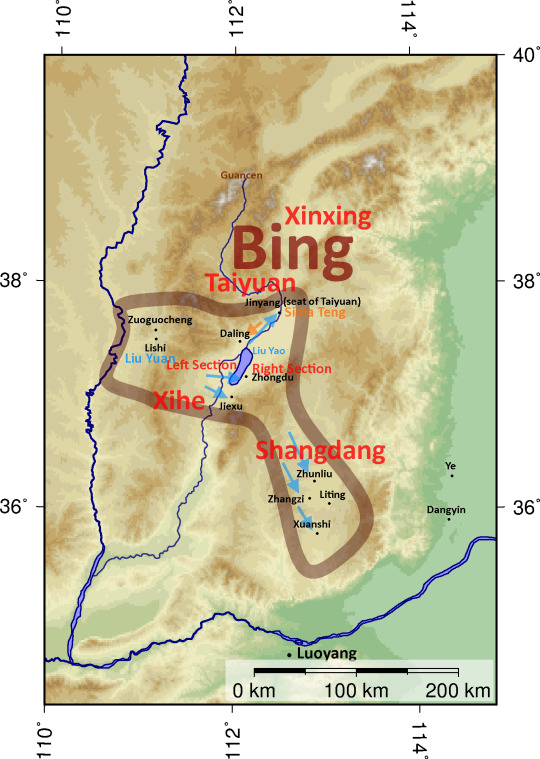
(Li Xiong)
1st Year of Jianxing, Spring, 1st Month [22 February – 22 March), Luo Shang arrived at Jiangyang. The Minister of the Army, Xin Bao, went to Luo to show the circumstances. A written decree gave authority to control Badong, Ba commandery, and Fuling commanderies, to supply his army taxes.
(JS066: At the time the Inspector of Yi province, Luo Shang, was defeated by Li Te. He dispatched envoys to announce the urgency and request provisions. Hong circulated a letter to supply and provide. But the provincial office's mainstays and guidelines, as the transport roads were isolated and remote, and the civil and military officials wanting and weary, desired to use Lingling to alone transport 5 000 hu of rice to give to Shang. Hong said:
You Lords have not yet thought about it, that is all. Under Heaven is a single family, this and that are not different. If I today provide for him, then there is no anxiety in looking west.
Thereupon he used 30 000 hu of rice from Lingling to provide for him. Shang relied on it to strengthen himself.)
Winter, 10thMonth [14 November – 13 December], the various generals firmly requested Xiong accede to the venerated rank. (HYGZ: Yang Bao and Yang Bao together urged Xiong to declare himself King.) Hence he presumptuously declared himself King of Chengdu, with an amnesty within his territories, and changed the inaugural to Jianxing [“Establishing the Rise”]. He removed the Jin laws, and condensed the law into seven chapters.
He used his junior uncle Xiang# as Grand Tutor, his commoner-born older brother Shi as Grand Guardian, the Smashing Charges Li Li as Grand Commandant, his junior cousin, the Establishing Domination Li Yun as Minister over the Masses, the Supports the Army Li Huang as Minister of Works, the Talented Officials Li Guo as Grand Steward, Yan Shi as Prefect of the Masters of Writing, Yang Bao as Supervisor, Yang Fa as Palace Attendant, Yang Gui as Master of Writing, Yang Hong as Inspector of Yi province, Xu Yu as Garrisons the South, Wang Da as Army Teacher. For the remaining civil and military officials, he designated and conferred each proportionally.
He retroactively venerated his great grandson Hu as the Mighty [huan] Duke of Ba commandery, his grandfather Mu as the Accomplished [xiang] King of Longxi, his father Te as the Luminous [jing] King, his mother Ms. Luo as Queen Dowager. His senior uncle Fu as the Ardent [lie] King of Qi, his middle uncle Xiang as the Martial [wu] King of Liang#, his middle uncle Liu as the Civil [wen] King of Qin, his older brother Dang as the Strong and Civil [zhuangwen] Duke of Guanghan.
Winter, Shang relocated to station at Ba commandery. He dispatched an army to plunder within Shu. He beheaded Xiong's granduncle Ran, and captured Xiang#'s wife Zan, his son Shou, and his brothers.
12th Month [12 January – 10 February], Xiong's Grand Commandant Li Li invaded Hanzhong, and killed the Battle Leader Zhao Min.
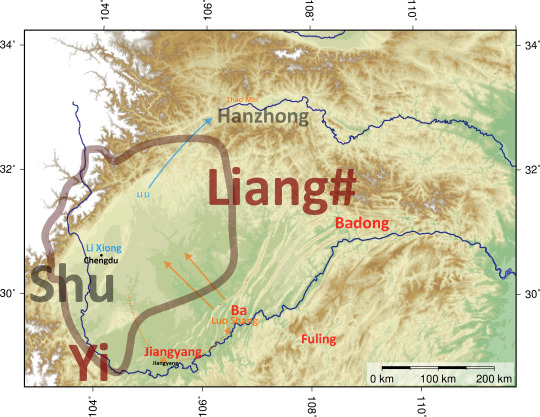
(Zhang Gui)
Reaching the difficulties of the two Kings of Hejian and Chengdu, he dispatched 3 000 troops to proceed east to the Imperial City.
Earlier, at the end of Han, a man of Jincheng, Yang Chengyuan, killed the Grand Warden in rebellion. A man of the commandery, Feng Zhong, attended to the corpse, shouting and weeping. He vomited blood and died.
A man of Zhangye, Wu Yong, was appointed by the Colonel who Protects the Qiang, Ma Xian. Later he was on the staff of the Grand Commandant, Pang Can. Can and Xian defamed each other with crimes that merited death. Each pulled on Yong as evidence. Yong planned and reasoned without the two accepting responsibility, and thereupon he cut his own throat and died. Can and Xian were ashamed and remorseful, and themselves made peace and cleared out with each other.
Gui in both cases sacrificed at the their tombs and honoured their sons and grandsons.
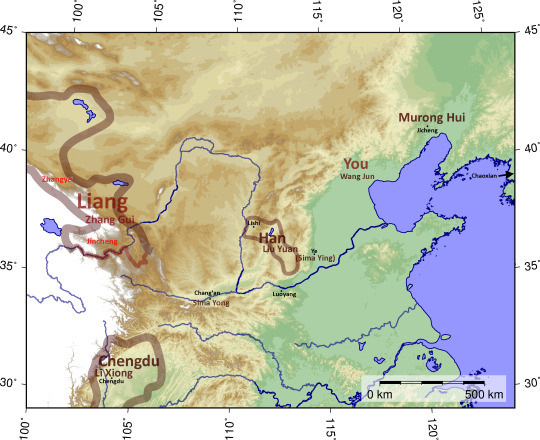
13 notes
·
View notes
Text
The lineage of the Tang imperial house and its problems
By the time of the Sui-Tang era, a person’s culture played a more important role than his race. The ethnic origin of the Yang (楊) clan of the Sui and the Li clan of the Tang did not have much to do with their policies. They might well have descended from prominent Han families, but it is certain that these clans, a few generations back from the dynastic founders, had lived in the Wuchuan garrison, north of Yinshan (陰山) mountain for quite a long period of time. This historical fact seems to have given rise to the suspicion that the Sui and Tang imperial houses were of barbarian origin.
The suspicion about the origin of the Li clan had existed from the very beginning of the dynasty, because they had once had the hu surname Daye (大野). The Buddhist monk Falin (法琳) declared before Taizong that the Tang imperial house originated from Xianbei Tuoba Dadu (達闍 i.e., Li in Chinese) which was a noble scion of Yinshan, i.e., a barbarian lineage. Although Taizong reprimanded Falin, during the war of unification an enemy, Dan Xiongxin (單雄信), called Taizong’s brother Yuanji (元吉) a hu child, and a Tang minister Sun Fuqie (孫伏伽) let slip that when Gaozu Li Yuan was a child his friends were all queue-haired because the royal family was deeply imbued with hu custom.
The in-laws of the royal family were completely of the hu line. Li Yuan’s mother was a daughter of Dugu Xin (獨孤信), the Grand Marshal of the Northern Zhou, and a sister of Empress Dugu of Emperor Wen of the Sui, making Li Yuan nephew-in-law to Yang Jian (楊堅) and maternal cousin of Emperor Yang (煬帝). Li Yuan married the daughter of Dou Yi (竇毅), who was of the Xianbei line and a prefectural commander of the Sui. The mother of Empress Dou was the elder sister of Emperor Wu of the Northern Zhou, Senior Princess Xiangyang (襄陽長公主).
The lifestyles of Taizong and his crown prince Chengqian (承乾) were not much different from those of the hu people. During the incident of Xuanwu Gate (玄武門), Taizong killed his younger brother Yuanji and made Princess Yang, Yuanji’s wife, his own; Zhu Xi’s remark on this behavior is well known. Chengqian followed hu custom as well. He stole and slaughtered cattle and horses, and acted like a Turk qaghan, eating with his guards, wearing Turkic clothes, and speaking Turkic.
During Zhenguan period when the Tang royal ancestral temple was being set up, the ministers were discussing who should be the progenitor, and Yu Zhining (于志寧) objected to the suggestion that it be Li Gao (李暠). If Li Gao was their true ancestor, why would the early Tang emperors not want the family of Li Bao of Longxi (隴西), who were descendants of Li Gao, included in the imperial clan lineage? And why did Gaozong further lower the family rank of Li Bao? Thus it has been argued that the ancestors of the Tang imperial house must have been a degraded household of the Lis of Zhaojun (趙郡), or had just borrowed the surname of Li of Zhaojun [Li of Zhaojun - one of the Four Great families of Shandong, very influential in the beginning of the Tang era]. Given the fact that Gaozong suppressed Li Bao and did not honor the lineage of Zhaojun Lis, it is most likely that the actual pedigree of the Tang imperial house was quite different from what it claimed to be and that it was ethnically non-Han Chinese.
The Tang was ruled by the Han people in name, but in reality was a multi-racial regime, so the Sui-Tang dynasty was still seen as a Xianbei state by the nomads of Eurasia or the people from the western regions, and Tang was called Taugas, Tamhaj, or Tabgaĉ which stood for Tuoba. The dynasties from the Dai (代) through Northern Wei and on to the Tang are separate according to the Chinese-style names for dynasties, but in fact form a continuous Tuoba state. Considering the continuity and commonality between these dynasties, placing them under the single heading of the Tuoba state seems appropriate. In this aspect, westerners from the fifth to the ninth century who called China Taugas, Tamhaj, or Tabgaĉ, were closer to the truth. Taizong’s acquisition of the title “Heavenly Qaghan” after the destruction of the Eastern Turks, Gaozong’s being addressed thus by nomadic rulers, and the fact that the majority of the early Sui-Tang imperial clan and high officials came from the military leaders of northern tribesmen, all provide further support to the Tuoba state argument.
Fabricating history and the rise of the zhonghua sovereign
The imperial houses of Sui and Tang saw themselves as traditional Han Chinese, although they were genetically descendants of nomadic tribesmen such as the Xianbei and others. But no matter how they identified themselves and their dynasties, few saw them and their dynasties as purely Han Chinese. It is clear now that the Li house of the Tang did not descend from a renowned clan, even if they had been Han Chinese.
Why then did the Tang imperial house want to fabricate a lineage to appear as if it had been one of the renowned Han aristocratic clans? Throughout Chinese history, a certain degree of sinicization has been necessary for anyone or anything alien to come to China and earn a place there. This was the case for Buddhism as well as Nestorian Christianity, but this did not mean they ceased to be Buddhism or Christianity. In addition to the issue of sinicization, the Wei-Jin-Northern and Southern Dynasties era was an age of pedigree.
Chen Yinke (陳寅恪) has raised questions about Taizong’s re-publication of the History of the Jin and his ordering the writing of The Record of Clans and Lineages in the Zhenguan Reign Period (Zhenguan shizu zhi 貞觀氏族志), suggesting that the motive behind the omission, among the Sixteen Kingdoms, of Former Liang (前涼) and Western Liang (西涼) from the History of the Jin was the same as that behind The Record of Clans and Lineages in the Zhenguan Reign Period: namely to exalt the Li clan of the Tang and prove that they had a long and glorious pedigree. Many dynastic histories were written during Taizong’s reign; these were generally dynastic histories from after the era of the Three Kingdoms or from the History of the Jin, now re-written to conform to Tang legitimacy. The Tang imperial house strove to dispel the doubt that they originated from the Xianbei Tuoba tribe, and influenced the planning and compilation of dynastic histories, sometimes even down to the wording of the contents.
First, let us look at the chronological records (zaiji 載記) of the History of the Jin. There are thirty chapters of chronological records in the book. The name originated from The Eastern Watch Records of the Han (Dongguan Hanji 東觀漢記), written by Ban Gu (班固) under order of Emperor Ming, and the number of thirty chapters seems to have been taken from the thirty chapters of biographies of feudal lords and eminent people (shijia 世家) in The Records of the Grand Historian. While the shijia is a record for each feudatory, the zaiji is a chronicle for the independent political entities in China which were not enfeoffed by the Chinese emperor. By including the Sixteen Kingdoms with the zaiji, Taizong set them in a different category and treated them as extraneous to the legitimate Jin dynasty, clearly taking the Han Chinese attitude of degrading alien regimes.
The source for Taizong’s History of the Jin was The Spring and Autumn Annals of the Sixteen Kingdoms by Cui Hong of the Northern Wei, and in this book one record was devoted to each state; notably, though, two states which were recorded in the Annals were omitted in the zaiji of the History of the Jin. They are Former Liang (301–76), which was established by a Han Chinese, Zhang Gui (張軌) of Anding (安定), and which occupied the Hexi corridor (河西回廊), and Western Liang (400–421) which was established by Li Gao of Longxi. The latter was the person later manipulated to become the ancestor of the Tang imperial house, and omitting him and his state was surely Taizong’s intention.
Another example is the compilation of the History of the Southern Dynasties (南史) and the History of the Northern Dynasties (北史), which concealed two underlying intentions. The first was to tie the Southern Dynasties (南朝) and Northern Dynasties (北朝) into one term, the Southern and Northern Dynasties (南北朝). If Taizong had truly been in favor of the Han Chinese point of view, he could have given legitimacy to the Southern Dynasties; but he could not ignore his own racial origins in the Northern Dynasties, and thus merging the two was the better option. Second, by including the Sui dynasty, the unifier of China, among the Northern Dynasties, he wanted to minimize the credit they received for having accomplished that unification.
Many histories were published in the early Tang. Taizong’s reign saw the compilation of the so-called History of the Five Dynasties, namely History of the Liang, History of the Chen, History of the Northern Qi, History of the Zhou, History of the Sui, and in 646 History of the Jin (these six historical works are known as the Six Histories). Then, during Gaozong’s reign, still under the shadow of Taizong, the History of the Southern Dynasties and the History of the Northern Dynasties were completed. Among the twenty-four histories that are considered official dynastic histories, eight—a third of the total—were published at this time. Taizong had opened up a new era in Chinese history publication by beginning the tradition of government-sponsored official history, and also by permitting the incumbent emperor to inspect the records about himself, something that had previously been forbidden, and giving instructions on how to write about the incident of Xuanwu Gate.
Taizong’s manipulation of history was along the same lines as Gao Huan (高歡) of the Northern Qi, who distorted history and transformed his family into the renowned Bohai Gao clan; but it was successful. Tang monarchs managed to transform themselves from racially and culturally hu rulers into zhonghua emperors to such an extent that people of later times accept without doubt that the Tang was a legitimate Chinese dynasty.
Taizong’s satisfaction with the effectiveness of official histories is manifest in the edict ordering the re-publication of History of the Jin: “How great is the usefulness of historical books!”
Source:
From Barbarians to the Middle Kingdom: The Rise of the Title “Emperor, Heavenly Qaghan” and Its Significance
by Han-je Park
http://cces.snu.ac.kr/data/publications/jces3_2park.pdf
29 notes
·
View notes
Photo
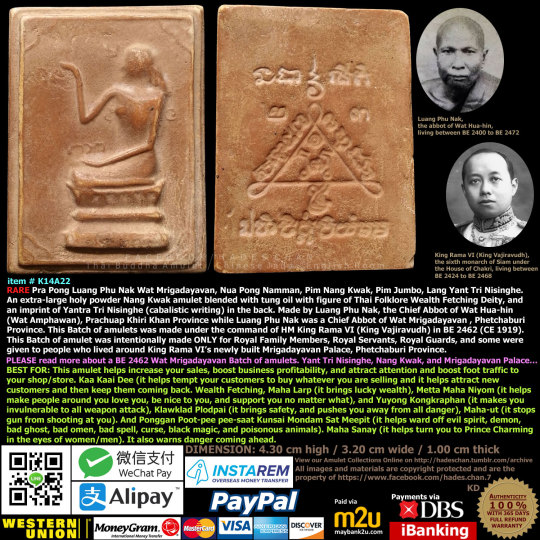
item # K14A22
RARE Pra Pong Luang Phu Nak Wat Mrigadayavan, Nua Pong Namman, Pim Nang Kwak, Pim Jumbo, Lang Yant Tri Nisinghe. An extra-large holy powder Nang Kwak amulet blended with tung oil with figure of Thai Folklore Wealth Fetching Deity, and an imprint of Yantra Tri Nisinghe (cabalistic writing) in the back. Made by Luang Phu Nak, the Chief Abbot of Wat Hua-hin (Wat Amphawan), Prachuap Khiri Khan Province while Luang Phu Nak was a Chief Abbot of Wat Mrigadayavan , Phetchaburi Province. This Batch of amulets was made under the command of HM King Rama VI (King Vajiravudh) in BE 2462 (CE 1919). This Batch of amulet was intentionally made ONLY for Royal Family Members, Royal Servants, Royal Guards, and some were given to people who lived around King Rama VI’s newly built Mrigadayavan Palace, Phetchaburi Province.
……………………………………………
BEST FOR: This amulet helps increase your sales, boost business profitability, and attract attention and boost foot traffic to your shop/store. Kaa Kaai Dee (it helps tempt your customers to buy whatever you are selling and it helps attract new customers and then keep them coming back. Wealth Fetching, Maha Larp (it brings lucky wealth), Metta Maha Niyom (it helps make people around you love you, be nice to you, and support you no matter what), and Yuyong Kongkraphan (it makes you invulnerable to all weapon attack), Klawklad Plodpai (it brings safety, and pushes you away from all danger), Maha-ut (it stops gun from shooting at you). And Ponggan Poot-pee pee-saat Kunsai Mondam Sat Meepit (it helps ward off evil spirit, demon, bad ghost, bad omen, bad spell, curse, black magic, and poisonous animals). Maha Sanay (it helps turn you to Prince Charming in the eyes of women/men). It also warns danger coming ahead.
……………………………………………
A BE 2462 WAT MRIGADAYAVAN BATCH OF AMULETS
Pra Somdej Wat Maruekkhathaiyawan (Wat Mrigadayavan), a Batch of amulets made of Tri-nisinghe Holy Powder as of Somdej Pra Sangglaraj Suk Kai-tuan of Wat Plub, and Somdej Pra Buddhachan Toh of Wat Rakang. The Holy Powder prepared by LP Nak himself with Poon Leark Hoi (plaster cement made from burnt seashell), and Namman Tang-ew (tung Oil). This Batch of amulets was made under the Royal Order of King Rama VI of Bangkok Era for the best protection to all of his family members, Royal Servants, Royal Guards, and people who worked for him at Maruekkhathaiyawan Racha Nives Summer Palace in Petchaburi Province. And HM King Rama VI also had his kindness to give amulets from this Batch to people who lived around the Maruekkhathaiyawan Racha Nives Summer Palace.
The Imperial Blessing Ceremony was held at Wat Maruekkhathaiyawan, and all Holy monks of Petchaburi Province were invited, King Rama VI was a Master of Blessing Ceremony (non-monk part). Wat Maruekkhathaiyawan was under Royal Support of HM King Rama VI.
……………………………………………
YANT TRI NISINGHE
Yant Tri Nisinghe cabalistic writings is a yantra for Yuyong Kongkraphan (good health, longevity, safety, away from danger, invulnerable to all weapon attack), and Maha-ut (Stopping gun from shooting at you and/or those gun will miss its aiming target). Thai men love to have yantra Tri Nisinghe tattoo on their skin, and having an amulet with yantra Tri Nisinghe is the same as you have this yantra on your skin.
……………………………………………
NANG KWAK
Nang Kwak is a spirit or household divinity of Thai folklore. She brings wealth & prosperity. Nang Kwak is a benevolent spirit. She is deemed to bring luck, especially in the form of money, to the household. She is the patron Deity of all Merchants and Salesmen and can be seen in almost every business establishment in Thailand.
Thai people like to have a figurine or cloth poster (called a Pha Yant,or Yantra Cloth) of this goddess in their home or shop, where it is often placed by the shrine. Some people also wear amulets with her figure around the neck, which is a logical development, due to the fact that many people in Thailand must travel around to sell their wares, which makes a portable nang Kwak amulet the obvious choice for such a person.
Legends
Although Nang Kwak is more a figure of popular folklore than a religious deity, there are Buddhist legends that seek to incorporate her into the Buddhist fold.
One Buddhist legend presents Nang Kwak as Nang Supawadee. About 2500 years ago, before or during the time when Buddhism was beginning to spread, in the small town of Michikasandhanakara, in the Indian province of Sawadtii, there was a married couple, Sujidtaprahma and his wife Sumanta, who had a daughter named Supawadee. They were merchants who sold small amounts of wares on the markets, only earning just enough to maintain their small family from day to day. One day, they were discussing their hopes and dreams for the future, and decided that they should try to expand their business to make more profit and begin to think of being able to save something for their old age.
As a result of this conversation, they decided to try to afford to buy a gwian (cart) in order to use to travel with and sell their wares to other towns and villages. They also then brought wares from the other towns to sell in Sawadtii and Michigaasandhanakara when they returned. Sometimes, Supawadee would ask to tag along for the ride, and help them. One day, as Supawadee was helping her parents to sell wares in a distant town, she was lucky to be able to hear a sermon by Phra Gumarn Gasaba Thaera; she was so convinced and moved by his sermon, that she took refuge in the Triple Gem. When Gasaba Thaera saw her faith and devotion, he collected all his powers of thought and concentration, for he was an Arahant, and bestowed blessings of good fortune and luck in salesmanship on Nang Supawadee and her Family.
Another story tells of Nang Kwak living on a higher plane of existence: Nang Kwak was the daughter of Pu Chao Khao Khiao, meaning ‘Grandfather Lord of the Green Mountain’ (Khao Khiao). Pu Chao Khao Khiao was a Lord of the Chatu Maha Rachika realm (one of the lower levels of Heaven - an Asura realm of giants and pretas). His other name is 'Pra Panasabodee’, and he is the Lord of the forest and places where wild plants grow. In that time, there was an Asura demon called To Kok Khanak (also known as “To Anurak”). To Kok Khanak was a good friend of Pu Chao Khao Khiao, who had been attacked by Phra Ram (the hero of Ramakien, Thai version of the Ramayana), who had thrown a Kok tree at him which pierced his chest and carried him through space to be pinned to the side of Pra Sumen. In addition, Pra Ram cursed him with the following magic spell: 'Until your descendants weave a Civara monks robe from lotus petals, and offer it to Pra Sri Ariya Maedtrai (Maitreya the future Buddha) your curse will not be lifted.’
After this, Nang Prachant, the daughter of Lord Kok Khanag had to serve her father, spending the days and nights trying to weave a Civara robe from lotus petals, in order to have it ready for offering to Pra Sri Ariya Maedtrai who will descend to become enlightened in a future age. Meanwhile To Kok Khanak had to remain cursed and pinned to Pra Sumen and his daughter was in a dire situation without her father to help run things. Since she had to spend all her time weaving the Civara, she had no time to sell things or make money, nor time to run a shop. When Chao Khao Khiaw heard this, he felt compassion and sent his daughter Nang Kwak to go stay with her. Because of her merit, Nang Kwak caused merchants and rich nobles to flock to Nang Prachant’s home and bestow gifts of gold, silver and money on her. Nang Prachant became wealthy and led a comfortable life.
……………………………………………
MRIGADAYAVAN PALACE
Mrigadayavan Palace (Phra Ratcha Niwet Maruekkhathayawan ) is a former residence of His Majesty King Vajiravudh or Rama VI who ruled Siam from 1910 to 1925. It is in Cha-am in Phetchaburi Province, Thailand. King Vajiravudh visited the palace twice during his reign. His first visit was during the summer of 1924 when he stayed for three months. His second visit lasted two months in the summer of 1925, after which he died. The palace is now a property of the Crown Property Bureau and is under the management of The Foundation of Mrigadayavan Palace under the patronage of Princess Bejaratana (FMP), the only daughter of Vajiravudh.
……………………………………………
DIMENSION: 4.30 cm high / 3.20 cm wide / 1.00 cm thick
……………………………………………
item # K14A22
Price: price upon request, pls PM and/or email us [email protected]
100% GENUINE WITH 365 DAYS FULL REFUND WARRANTY
Item location: Hong Kong, SAR
Ships to: Worldwide
Delivery: Estimated 7 days handling time after receipt of cleared payment. Please allow additional time if international delivery is subject to customs processing.
Shipping: FREE Thailandpost International registered mail. International items may be subject to customs processing and additional charges.
Payments: PayPal / Western Union / MoneyGram /maybank2u.com / DBS iBanking / Wechat Pay / Alipay / INSTAREM
*******************************************
3 notes
·
View notes
Text
Zhong Hui’s Proclamation To Shu
From his SGZ:
與蜀將張翼、廖化等合守劍閣拒會。會移檄蜀將吏士民曰:
Jiang Wei and others guarded Jiange to resist Zhong Hui's invasion. Zhong Hui thus distributed a proclamation to the generals, officials, gentry, and people of the Shu region:
往者漢祚衰微,率土分崩,生民之命,幾於泯滅。太祖武皇帝神武聖哲,撥亂反正,拯其將墜,造我區夏。高祖文皇帝應天順民,受命踐阼。烈祖明皇帝奕世重光,恢拓洪業。然江山之外,異政殊俗,率土齊民未蒙王化,此三祖所以顧懷遺恨也。今主上聖德欽明,紹隆前緒,宰輔忠肅明允,劬勞王室,布政垂惠而萬邦協和,施德百蠻而肅慎致貢。悼彼巴蜀,獨為匪民,愍此百姓,勞役未已。是以命授六師,龔行天罰,征西、雍州、鎮西諸軍,五道並進。古之行軍,以仁為本,以義治之;王者之師,有征無戰;故虞舜舞干戚而服有苗,周武有散財、發廩、表閭之義。今鎮西奉辭銜命,攝統戎重,庶弘文告之訓,以濟元元之命,非欲窮武極戰,以快一朝之政,故略陳安危之要,其敬聽話言。益州先主以命世英才,興兵朔野,困躓冀、徐之郊,制命紹、布之手,太祖拯而濟之,與隆大好。中更背違,棄同即異,諸葛孔明仍規秦川,姜伯約屢出隴右,勞動我邊境,侵擾我氐、羌,方國家多故,未遑修九伐之征也。今邊境乂清,方內無事,畜力待時,并兵一向,而巴蜀一州之眾,分張守備,難以御天下之師。段谷、侯和沮傷之氣,難以敵堂堂之陳。��年以來,曾無寧歲,征夫勤瘁,難以當子來之民。此皆諸賢所親見也。蜀相壯見禽於秦,公孫述授首於漢,九州之險,是非一姓。此皆諸賢所備聞也。明者見危於無形,智者規禍於未萌,是以微子去商,長為周賓,陳平背項,立功於漢。豈晏安酖毒,懷祿而不變哉?今國朝隆天覆之恩,宰輔弘寬恕之德,先惠後誅,好生惡殺。往者吳將孫壹舉眾內附,位為上司,寵秩殊異。文欽、唐咨為國大害,叛主仇賊,還為戎首。咨困逼禽獲,欽二子還降,皆將軍、封侯;咨與聞國事。壹等窮踧歸命,猶加盛寵,況巴蜀賢知見機而作者哉!誠能深鑑成敗,邈然高蹈,投跡微子之踪,錯身陳平之軌,則福同古人,慶流來裔,百姓士民,安堵舊業,農不易畝,巿不回肆,去累卵之危,就永安之福,豈不美與!若偷安旦夕,迷而不反,大兵一發,玉石皆碎,雖欲悔之,亦無及已。其詳擇利害,自求多福,各具宣布,咸使聞知。
"It was not so long ago, at the final decline of the Han dynasty, when the realm was split asunder and the lives of the people were nearly snuffed out. Yet there were great men who stood against this looming disaster. First was Emperor Wu, Taizu (Cao Cao), puissant in war and sagacious in thought; he quelled chaos and restored order, steadied what was about to topple, and 'laid the foundations of our kingdom' as King Wen of Zhou once did. Next was Emperor Wen, Gaozu (Cao Pi), who heeded Heaven's will and respected the wishes of the people by accepting the Mandate and ascending to the imperial throne. Then came Emperor Ming, Liezu (Cao Rui), who added still more luster and glory to the dynasty and who expanded and improved the legacy of his forbearers. Yet despite the great strides made by these leaders, there still remained pockets of resistance beyond the distant mountains and rivers, leaders of illegitimate governments and mistaken traditions who steered the local populace away from receiving the blessings of the sovereign's moral transformation. How deeply did our three founders regret in their final moments that there remained those deprived of the royal sway!
"Our current sovereign (Cao Huan) is wise and virtuous, respectful and discerning, and he is a worthy successor to the enterprise of his ancestors. He is aided by the Regent Chancellor (Sima Zhao), who is loyal and reverent, perceptive and profound, and who has devoted his every effort to the cause of the imperial family. They promote wise government and offer deep kindness, and all the states of the world have replied with accord and harmony; they display virtue to every crude tribe, who have in turn humbly yielded and presented tribute. And they lament the obstinacy of the regions of Ba and Shu, who insist upon their robber state, and pity the people of these lands, who have been forced to toil and work incessantly. Thus have they ordered the Six Armies (of imperial authority) to set force on campaign against these bandits, acting as the instrument of Heaven's judgment. Even now, the armies of the General Who Conquers The West (Deng Ai), the Inspector of Yongzhou (Zhuge Xu), and the General Who Guards The West (Zhong Hui) are all advancing along five roads.
"Still, it has ever been a principle of warfare that the general takes benevolence as the foundation and supplements it by righteous principles, and that the commander of the sovereign seeks to secure submission without resorting to force of arms. Thus did Yu Shun (Emperor Shun) gain the obedience of the Youmiao people purely through the awesome display of a wardance; thus did King Wu of Zhou demonstrate propriety by distributing the bounty of Shang and the grain of the treasury and by honoring the villages of the esteemed servants of the fallen dynasty. It is therefore the firm wish of the General Who Guards The West, although he wields a terrible authority and commands a powerful host, to extend a courteous lesson and invitation to the enemy for the sake of preserving the lives of the people; it is his aim not to inflict total war or destructive battle, but merely to hasten the day of unification under one government. He hopes that this brief explanation of the certainties of danger and the prospects of peace may therefore find a receptive audience.
"What can be said of the First Sovereign of Yizhou (Liu Bei)? Though he possessed courage and ability and rose up with troops in the wilds of the far north, he suffered and stumbled through the regions of Jizhou and Xuzhou, and he served as the minion of Yuan Shao and of Lü Bu. Despite these things, Taizu (Cao Cao) saved and rescued him and showed him exceptional grace and favor. Yet in the midst of such treatment, the First Sovereign still turned his back on Taizu, abandoning the common cause in favor of his own ambition. Then there were Zhuge Kongming (Zhuge Liang), who schemed to take Qinchuan, and Jiang Boyue (Jiang Wei), who repeatedly invaded Longyou; both of them caused trouble and disturbances in our border regions and harried and harassed our Di and Qiang peoples, and it was only because of the many domestic troubles that occupied our attention that we refrained from punishing their nine offenses through a punitive campaign.
"Yet by now, our borders are peaceful and tranquil and our interior is without concerns, and we have nursed our strength and awaited the right moment. We have mustered our forces and have sent them against a single front, while even your forces of the single province making up Ba and Shu have been split up and stretched thin to defend multiple garrisons; how can they resist the hosts of all the realm? Your soldiers are still suffering from the wounds and the despair of their defeats at Duan Valley and at Houhe; how can they resist the solid discipline of our armies? Not once in recent years have your people been spared from military adventures, and your young men have grown weak and haggard; how can they compare with the strength and readiness of our populace? Gentlemen, these are all facts with which you are personally acquainted. And recall that as the Chancellor of Shu, Zhuang, was ultimately captured by the state of Qin, so too did Gongsun Shu eventually surrender his head to the Han dynasty; as it is said, 'no family has sole claim to all the narrows of the realm'. Gentlemen, you are doubtless aware of these stories.
"The wise perceive danger before it even takes shape, and the intelligent prevent disaster before the slightest bud appears. The Viscount of Wei abandoned the Shang dynasty and thus enjoyed an enduring legacy under the Zhou; Chen Ping defected from the Xiang clan (of Xiang Ji) and thus achieved great deeds for the Han. Why then should you gentlemen sit idly while the poison sets in, clinging to your posts and salaries rather than adapting to the circumstances?
"The court has ever extended Heaven's grace towards those who opposed it, and the Regent Chancellor has oft demonstrated the virtues of magnanimity and forgiveness, for they prefer mercy to judgment and seek to spare rather than to kill. In recent times, there was the Wu general Sun Yi; he raised his forces to come submit to the state, for which he was granted a lofty position and shown exceptional favor and payment. And there were Wen Qin and Tang Zi, who caused great harm to the state, serving as war leaders for despicable bandits rebelling against their sovereign. Yet although Tang Zi was captured in the heat of battle and Wen Qin's two sons yielded, all of them were still appointed as generals and granted marquisates, and Tang Zi was even granted a role in state affairs. Now consider how well these fellows were treated and favored, although it was only after all hope was lost that they at last heeded the Mandate. How much greater rewards can be expected for you gentlemen of Ba and Shu, who might yet recognize your situation and take the first step?
"We sincerely urge you to deeply consider your prospects of victory or defeat and to take this chance to tread a nobler path. Follow in the footsteps of the Viscount of Wei and imitate the example of Chen Ping. There is still time for you to secure the same blessings as these ancients and to leave a fine legacy for your descendants. Let the people be assured of their possessions and secure in their livelihoods; prevent the farmers from losing their fields or the merchants from being deprived of their goods. How glorious would it be if you could abandon a position as precarious as a stack of eggs in order to attain blessings of eternal repose? Yet if you do nothing and let this chance slip by, then once our great army is flung against you, the jade shall be smashed along with the stone. Even should you have regrets by then, it will be too late for you.
"Such are the General's views on your situation, and how you may yet secure good fortune for yourselves. Let word of this be spread far and wide, so that all may know of it."
15 notes
·
View notes
Text
Episode 69
Me: I’m not ready for this, I’m not ready for this
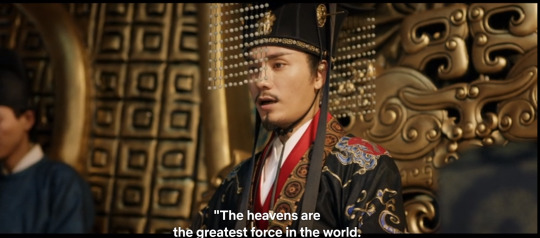
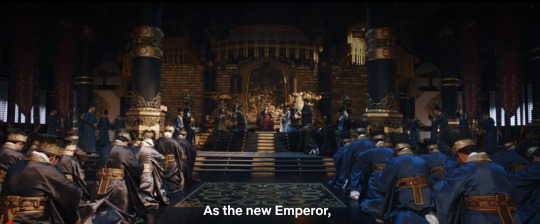
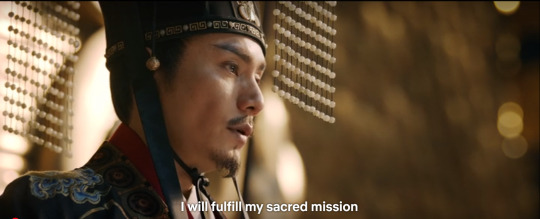
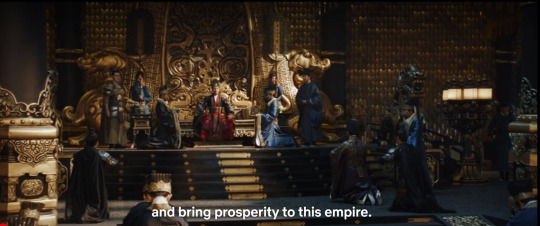
This is a direct call back to what his mother said to him in the end, the talisman she left for him, to tell him to find his “mission” ...although in her vision/hope for him, his “mission” did not involve sacrificing himself to the throne...
me: *whimpering * let me live
In (the redecorated) Fengyun Palace, Ning Yi rewards Gu Yan and Ning Cheng by giving them high positions in his administration and orders them to investigate the Huofeng Gang who has been “causing trouble in the capital”. We’re never told what this trouble is i.e. has something gone down AFTER the Emperor’s death/ attempted coup or is this Ning Yi acting on the information he had before about their collusion with Ning Qi? How long after the attempted coup did the coronation take place anyway? Anyways, he orders them to capture the gang members and bring Ning Qi to the palace for trial.
A note on the redecoration: the beautiful, large tapestry is gone, and replaced by a simpler one (can’t quite make out whether it’s fabric or not). The carpet has more muted colours. While Fengyun under Ning Shizheng was incredibly beautiful but also a little stifling in its grandeur, Ning Yi’s room is simpler, though still elegant and beautiful: I think it goes with what we are used to seeing him surrounded by in his older residence. Also, the Emperor continues to dress in muted brown/ blue/green hues; unlike Ning Shizheng who often wore yellow (apparently a favoured Imperial colour during the Tang dynasty? unless I’m mis- remembering that)
Headmaster Xin has been summoned to the Palace (evidently).
I can’t even begin to capture Ning Yi’s emotions here- again, absolutely fantastic job by Chen Kun- anticipation, nervousness, but also determined to “play it cool” as befits The Emperor- GOD I DIED A THOUSAND DEATHS IN TWO SECONDS- THESE TWO FUCKING FOOLS-
because, honestly, ZIYAN IS STILL THE FUCKING WORST, AS WE IMMEDIATELY SEE
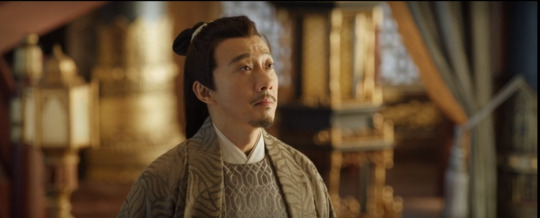
HE SPENDS LIKE AN ENTIRE MINUTE INSPECTING THE RENOVATIONS IN THE ROOM INSTEAD OF LOOKING AT THE GODDAMN FUCKING EMPEROR IN HIS FACE POWER MOVE BUT ALSO YOU’RE A FUCKING DICK ZIYAN AND YOU DON’T DESERVE HIM YOU REALLY DON’T
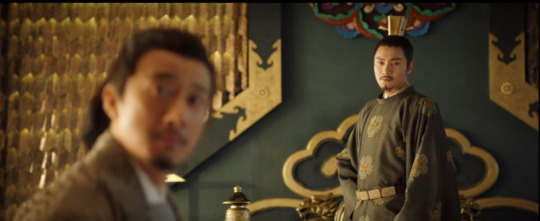
Like, I can’t get over NY’s expression here, annoyance, amusement and the underlying fondness, and just..like of course Ziyan would do this
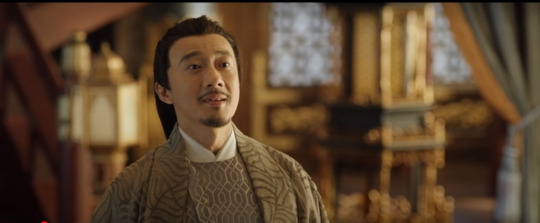
And I can’t capture that expression on Ziyan’s face as they finally make eye contact.
BUT ZIYAN IS DETERMINED TO BE A FUCKING ASSHOLE, HE’S STILL SO ANGRY
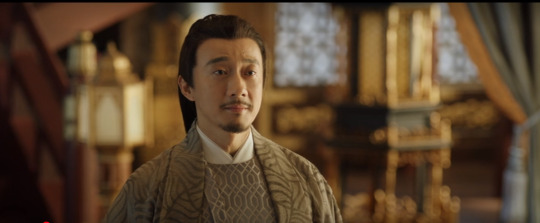
And that tips Ning Yi over from a fond exasperation to real anger
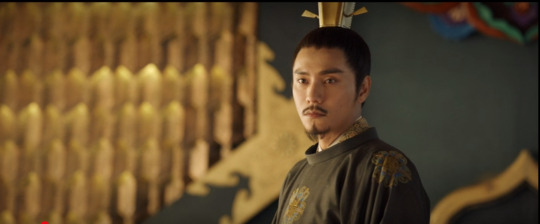
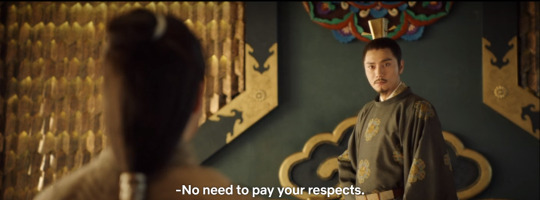
SO OF COURSE ZIYAN IS IMMEDIATELY FAKE RESPECTFUL
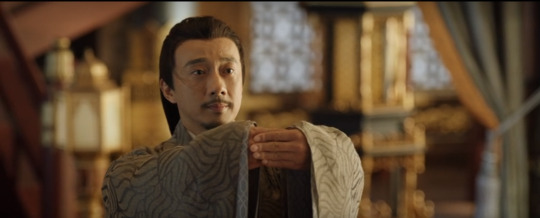
and Ning Yi seems to accept that he will have to be the one that gives in- he takes a few steps toward Ziyan
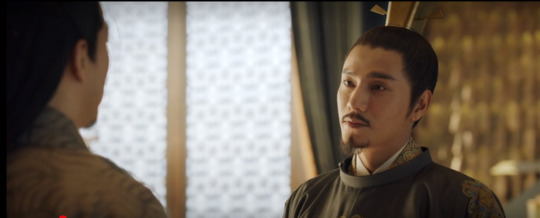
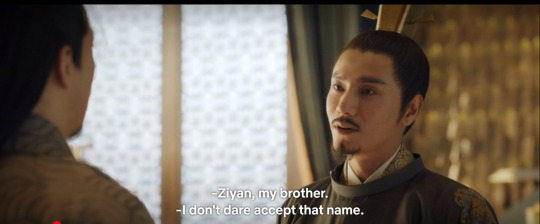
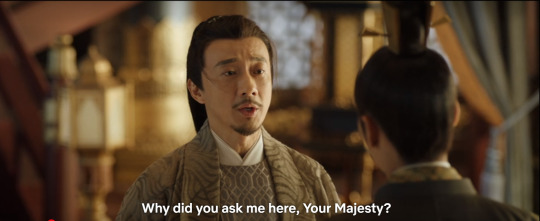
aksdjhakdhaskehakhd
JESUS ZIYAN WHAT WILL IT TAKE
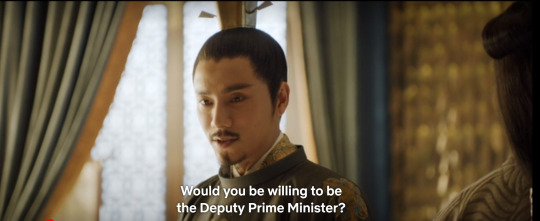
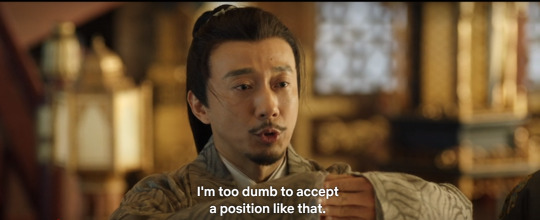
Of course, that really annoys Ning Yi (who strides back to the throne and puts distance between them) Why, he asks?
Because there’s chaos in the Capital since you took over, replies Xin Ziyan, and
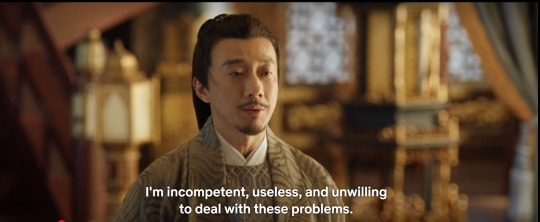
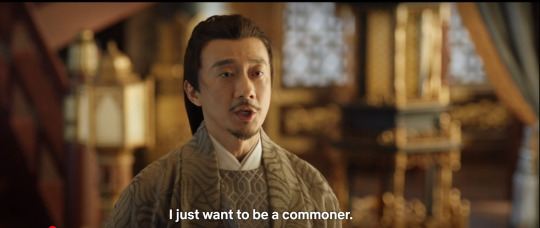
me: JESUS H. CHRIST ZIYAN TWIST THAT KNIFE SOME MORE WHY DON’T YOU
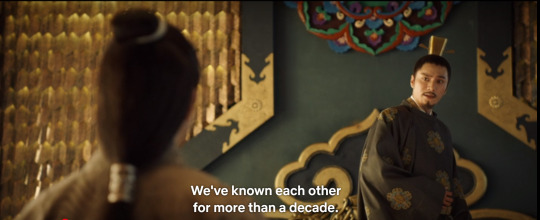
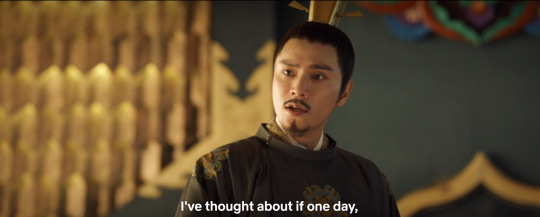
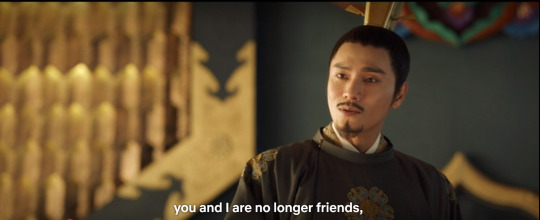
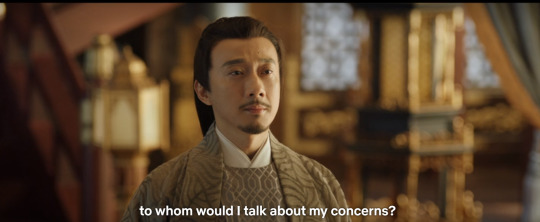
SO OF COURSE HE ORDERS HIM-
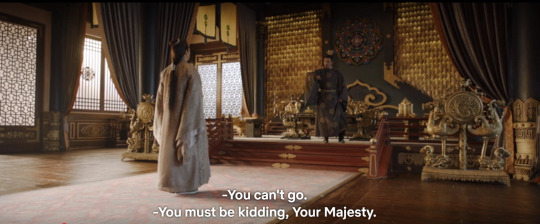
AND ZIYAN...
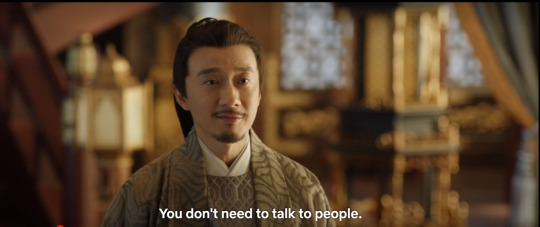
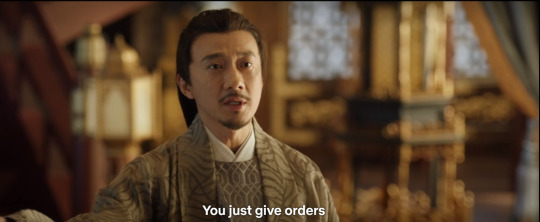
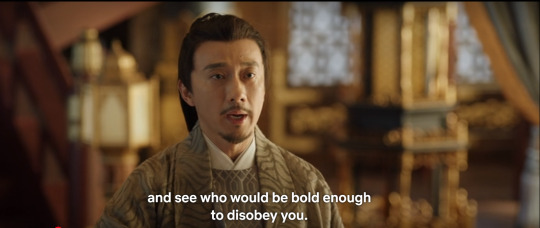
God,I hate to admit it, Ziyan is right...as Feng Zhiwei will soon find out...
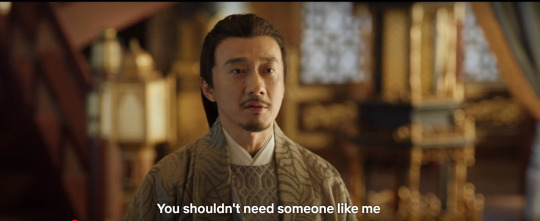
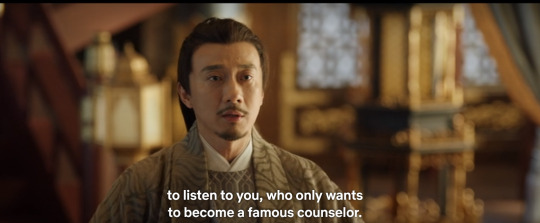
ARE WE STILL ON THAT? WE’RE STILL ON THAT.
In response Ning Yi says FINE, IF YOU WANT IT THAT WAY. (Someone please correct me if I’m wrong, but in this conversation he now switches the pronouns he’s been using for himself, I think- previously he refers to himself as Ning Yi, or in the manner he would when addressing a friend? but now he seems to switch to the “I, The Emperor” mode, and also he calls him by his full name “Xin Ziyan” instead of Ziyan xiōng )

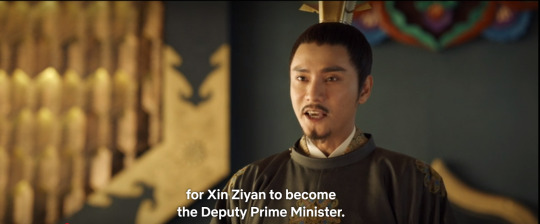
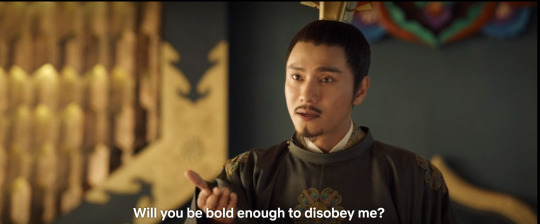
i love how the tone and words is utterly contradicted by his outstretched hand
ZIYAN YOU FUCKING DICK YOU ARE THE BLOODY WORST DON’T HURT MY BAE LIKE THIS both of you have made mistakes, and he deserves an apology from you as well.
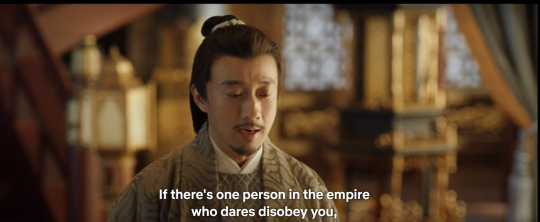
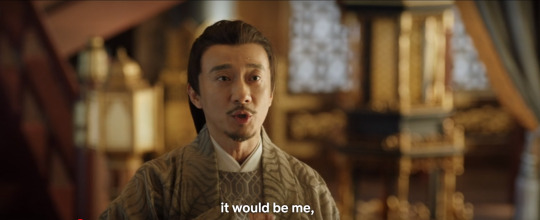
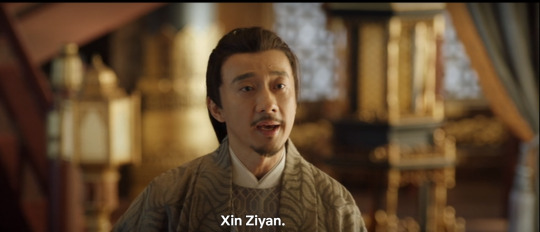
HAVE YOU GOT YOUR POUND OF FLESH YET YOU FUCKING DRAMA QUEEN
AND HE STRIDES OFF DRAMATICALLY, LEAVING NING YI ISOLATED
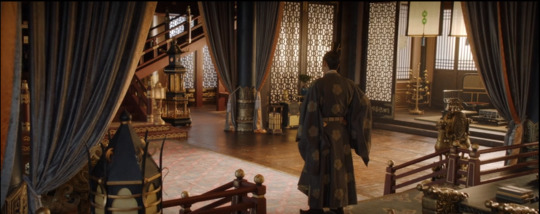
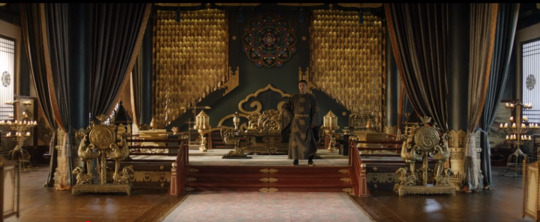
JESUS THIS SHOW DOES NOT FUCK AROUND.
Ning Yi has learnt the pain of isolation when stripped of all power, and now that he has it all, he’s learning it all over again.
AND THAT IS HOW YOU WRITE A TRAGEDY FOLKS
Meanwhile, on hearing that Ning Cheng and the Royal Guards are on their way to arrest him, Zhangsun Hong tells his lieutenant that Feng Zhiwei must be here to witness the cruelty of the Tiansheng Empire- must be there to witness his death. Zhangsun Hong basically wants to ensure that Zhiwei will never forgive Ning Yi, and thus complete his revenge on the Ning family.
WHICH BEGS THE QUESTION: WHAT IS GOING ON WITH FENG ZHIWEI SINCE THE EMPEROR’S DEATH AND NING YI’S ASCENSION TO THE THRONE.
WHO KNOWS?
BECAUSE THE SHOW REFUSES TO TELL US. ARRRRGHHH.
Anyways, very Dramatically, Feng Zhiwei and Gu Nanyi reach in time to see Zhangsun Hong be killed by Ning Cheng- although Ning Cheng had only wanted to arrest them, but y’know, FATE.
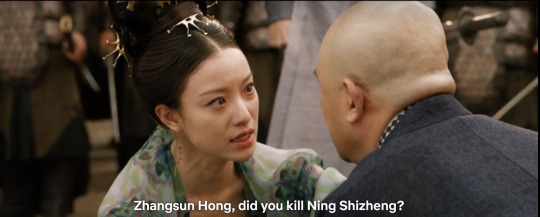
ER WHAT?
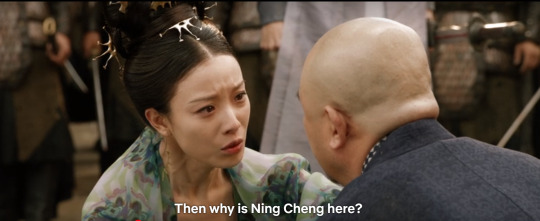
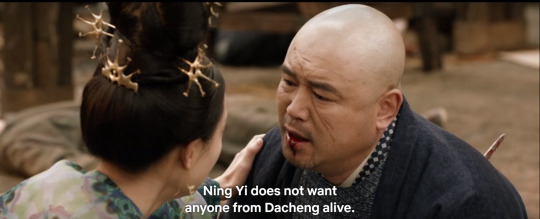
LIKE THIS MAKES NO SENSE. FENG ZHIWEI IS LITERALLY ONE OF THE CLEVEREST PEOPLE IN THE EMPIRE, YOU’RE TELLING ME SHE COULDN’T PUT TWO AND TWO TOGETHER AND MAKE FOUR? IN ALL THIS TIME????? SHE ALREADY KNEW THAT NING QI AND HE WERE HAND IN GLOVE. AND THAT’S PUTTING ASIDE THE FACT THAT ZHANGSUN HONG LITERALLY TOLD HER ALREADY THAT SHE NEEDN’T KILL NING SHIZHENG BECAUSE HE WOULD INSTEAD. AND THE NEXT THING HE TELLS HER BEFORE HE DIES IS THAT SHE SHOULD TRUST YUELING (WHICH IS THE ONLY REMAINING PART OF THE PUZZLE SHE DIDN’T KNOW.)
LIKE COMPLETELY APPALLING WRITING. I CAN’T EVEN.
There’s a tense moment where Feng Zhiwei almost kills Ning Cheng- but Gu Nanyi stops her.
Feng Zhiwei is grief stricken, but again repeats “What were you hiding from me?”
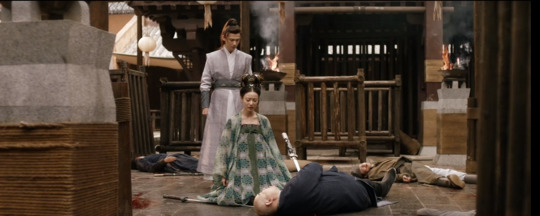
THE WOMAN WHO COULD SOLVE THE RIDDLES IN QINGMING ACADEMY CAN’T DO SIMPLE MATH.
WHAT THE FUCKING FUCK.
Anyways: Ning Qi is hiding out in the House of Lanxiang, which Yueling has bought out; alone, drunk, slightly insane, clutching the Emperor’s edict. Yueling encourages him to continue opposing Ning Yi, and not even Yijun can bring him back to his senses.
AGAIN: HE’S LITERALLY A STONE’S THROW AWAY, AND NING CHENG AND THE ROYAL GUARDS CAN’T FIND HIM???? DID THEY NOT INVESTIGATE WHERE YUELING DISAPPEARED TO?
Feng Zhiwei requests Helian Zheng to provide protection to her people, and he agrees. She plans to return with him and the remnant of Dacheng to Jinshi.
When Helian Zheng informs Ning Yi that he’s leaving, Ning Yi warns him “not to be blinded by love” ie don’t let your wife, the Princess of Dacheng, con you into launching an attack on Tiansheng. Helian Zheng’s answer reveals he has no qualms about NOT listening to the Emperor, and also pretty much warns Ning Yi to stay away from Zhiwei. Ning Yi is furious, of course, and though he does nothing at that moment, you get the sense that Jinshi is not going to be safe in the near future.
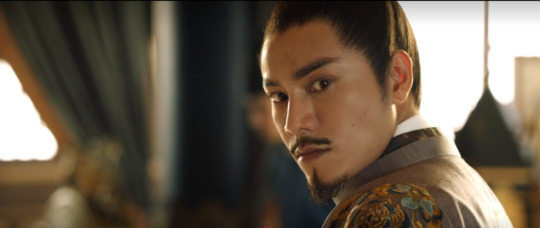
Yueling sends an anonymous message to Ning Cheng that Helian Zheng is concealing members of the Huofeng Gang in his entourage.
Our two babes meet on their bridge for the last time and have a brittle, poignant conversation where both are in so much pain, but cannot find a way back to each other.
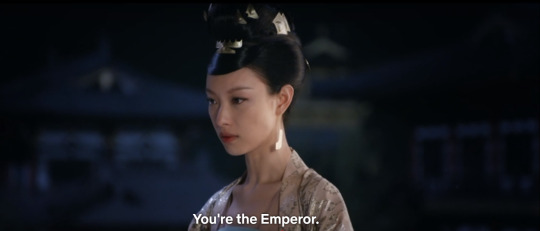
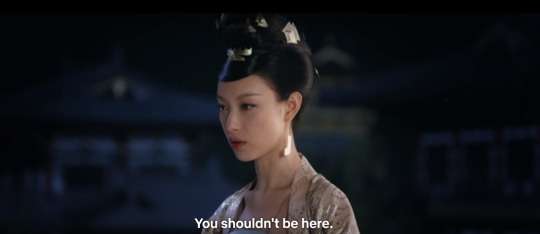
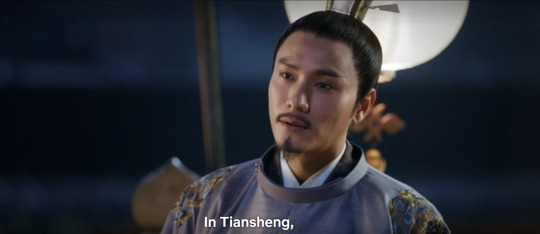
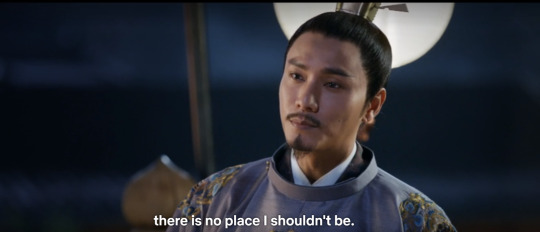
ding ding WRONG ANSWER DUDE
But Ning Yi presses his case, that before they didn’t have the power to stop themselves being separated, but now that he’s Emperor,
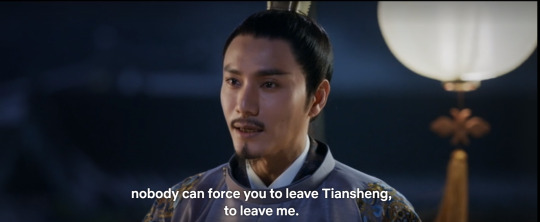
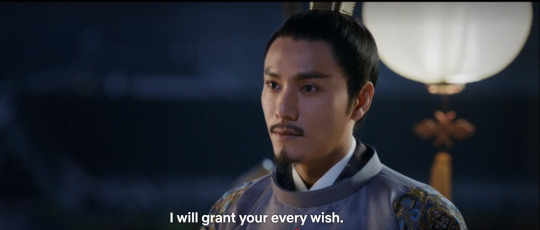
(again, correct me if I’m wrong, but he refers to himself as The Emperor here)
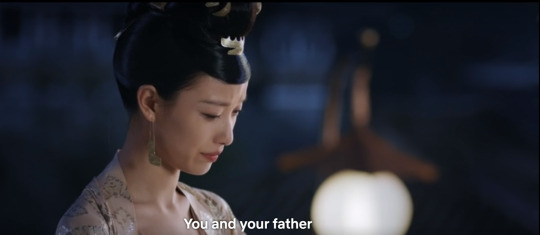
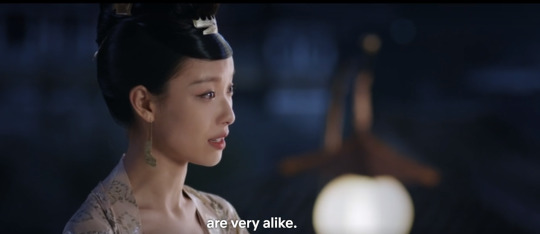
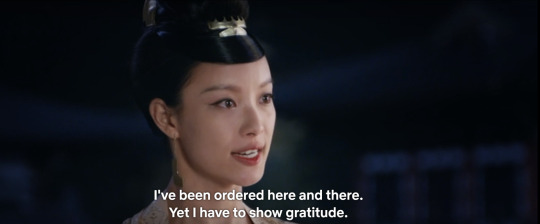
He makes a desperate confession, to stop her from leaving- about how he had gone to Jinshi to see her, but then, when he saw her happy and laughing with Helian Zheng, he lacked the courage to approach her.
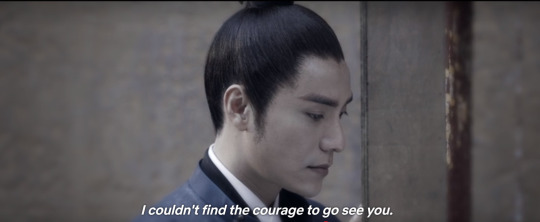
UGHHHHHHHHHH
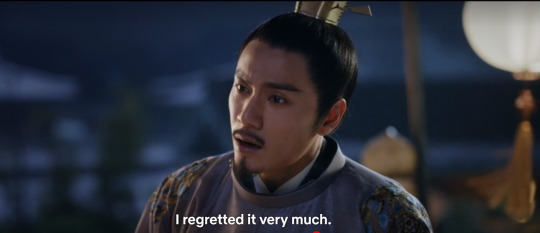
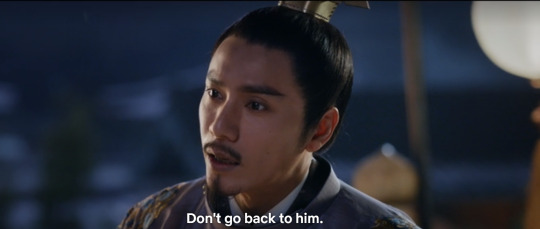
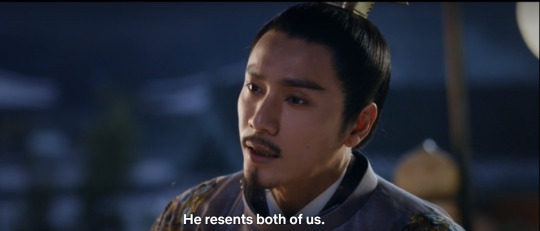
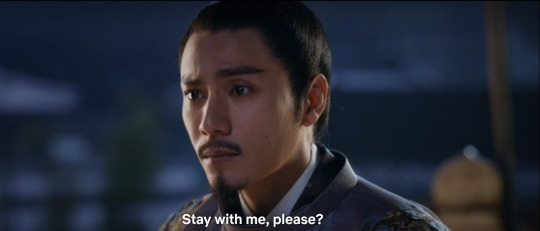
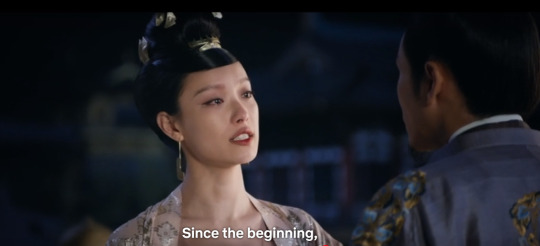
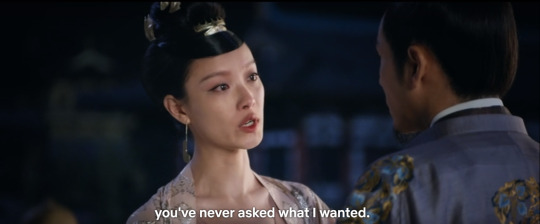
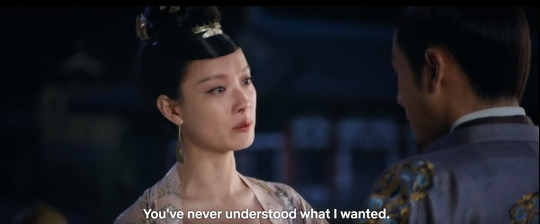
“What do you want?” he asks, once, twice, thrice but the regret soon turns to anger, in the face of her silence...and she walks away.
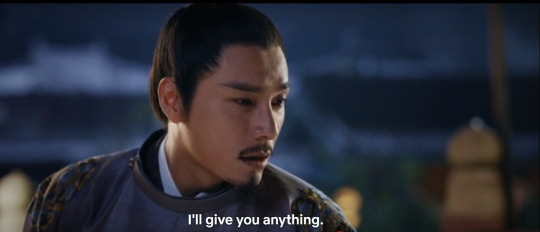
but all his power can’t bring her back to him, and he’s left, again, alone.
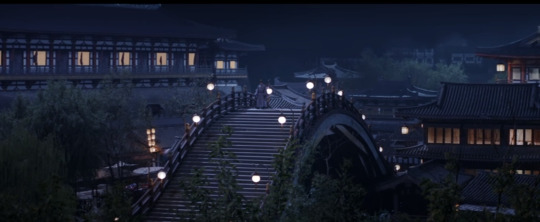
“Fate” takes a hand again, as Ning Cheng runs off to apprehend the Huofeng gang that Helian Zheng is escorting to Jinshi. It’s kind of odd that Ning Cheng does this without informing the Emperor- like diplomatic disaster, excuse me- but I suppose if I squint really hard, I can put it down to Ning Cheng’s deep sense of failure and regret that he couldn’t protect or save Ya Le, the person most important to Ning Yi.
But of course, disaster strikes.
Helian Zheng’s death leaves a furious Feng Zhiwei
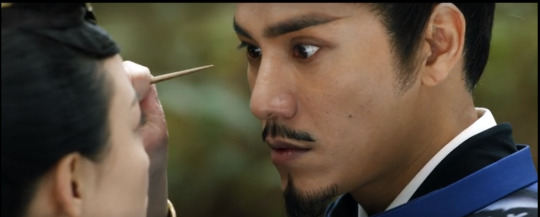
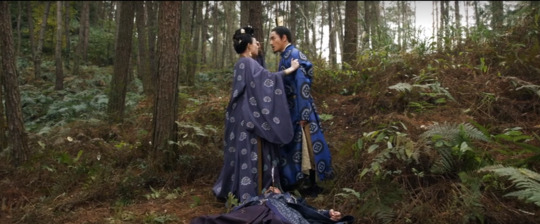
who breaks the token of their connection to each other
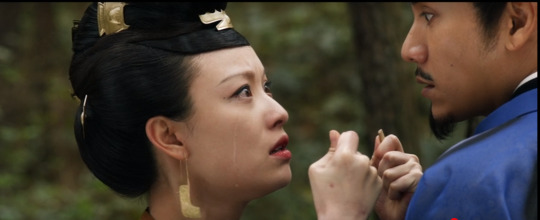
back in the control of The Emperor....who’s equally furious...
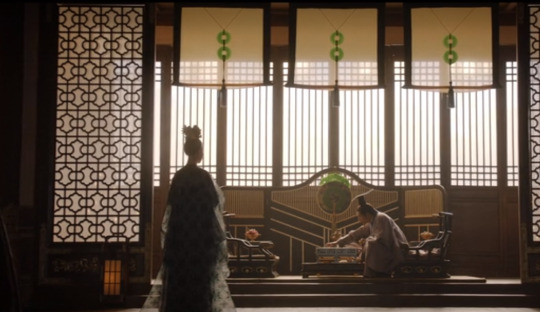
and so alone, he’s playing Go with himself (THIS SHOW DOES NOT FUCK AROUND, SERIOUSLY)
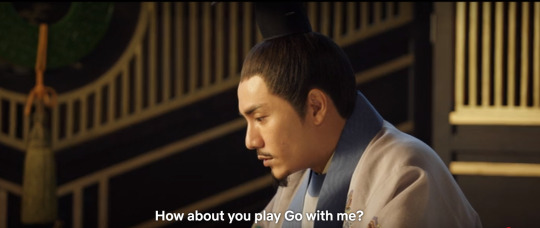
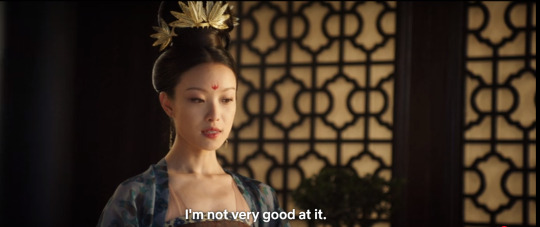
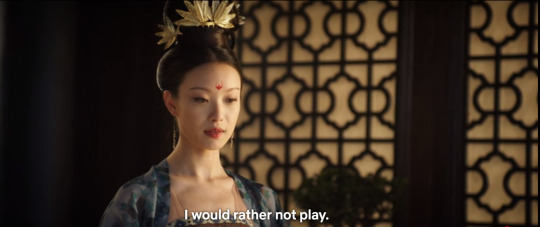
Me: this show is only pain, pain and more pain. WHY.
11 notes
·
View notes
Photo
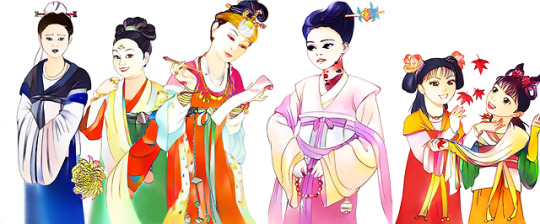
Romance of Sui and Tang: Sui Dynasty Princesses
Colored in the paintchainer website.
Historically, Emperor Wen of Sui and Empress Dugu are known to have five daughters. Four of them have been named and are also pictured here. The two remaining figures are apocryphal. There are no contemporary portraits of any of the women from the Sui Dynasty, so I made up my own designs, based somewhat off of the terracotta figures and murals of the period.
From left to right, they are: Yang Li-Hua the Princess Leping (historical), Princess Guangping (historical), Princess Xiangguo (historical), Princess Miaoyang (legend), Yang A-Wu the Princess Lanling (historical), and Princess Qionghua (legend).
Yang Li-Hua: Appears in Book of Sui, Northern Histories, and Book of Zhou. The eldest daughter of Emperor Wen, she was married at a young age to the second-to-last emperor of the Northern Zhou Dynasty. Her husband was one of the worst tyrants of his generation, but Li-Hua herself was a kind, gentle, graceful woman. Their marital spats grew to the point that he tried to kill her. Fortunately, he died after only ruling for a year. The Sui Emperor Yang Jian became regent because he was the father of the now Empress Dowager, and he soon seized the throne, established the Sui Dynasty, and put most of the royal family of the Northern Zhou to the sword. Li-Hua spent the rest of her life mourning the loss of her husband, her son, and her kingdom, but unable to hate her birth family. Instead, she led a quiet and lonely life as a widow, devoting her energies to raising her remaining daughter and grandchildren. Because she was a widow and a remnant of a vanquished dynasty, I drew her dressed in austere colors, her clothes in the fashion of the Northern Zhou, wistfully observing her sisters’ antics.
Princess Guangping: Appears by name in an appendix to the Biography of Yuwen Qing, found in both Book of Sui and Northern Histories. She married Yuwen Qing’s son Yuwen Jing-Li, but her husband died young. Her youngest son Yuwen Xiao was raised in the imperial palace by her brother Emperor Yang of Sui. When he reached adulthood, he was kept on as a court favorite, and if I might guess, some sort of male lover. He used his position to behave inappropriately with the palace maids, and even made flirtations toward Emperor Yang’s princesses. Yet Emperor Yang never punished him for his behavior. Since Yuwen Xiao was so irresistible, his mother must have also been a charming, vivacious person. She’s dressed in bright colors and has a confident smile. Her hairstyle comes from a Taoist stele from the end of the Northern Zhou period and is adorned with two jade double prong clips and comb. She wears a golden hinged jade bracelet and carries a metal perfume censer.
Princess Xiangguo: Appears by name in the Book of Sui in an appendix to the Biography of Li Yan. She married Li Zhangya, grandson of the Grand Marshal Pillar of the Nation Li Bi, nephew of the aforementioned Li Yan. He was commissioned as the Military Governor of Qinzhou, an area directly to the west of the Capital, facing the area of Tibet and Middle East and all the myriad kingdoms in the region. It was a crucial area that had to be guarded carefully, so Li Zhangya and the Princess must have have had a certain position of trust within the imperial court. The only other mention of her is in her sister A-wu’s biography, noting that she, along with the two other middle sisters, behaved arrogantly due to their high positions. She was a devout Buddhist, and one of her hand-copied sutra scrolls survive into the modern day. Thus, I’ve portrayed her as serene and literate. To reflect her husband’s position, her jewelry has more steppe nomad influences. She has a golden bull’s head ring and bracelet of jingle bells around her wrist, along with typical Chinese style bangle and a pair of golden “tiaotuo”/”chuan”, spring-clasped helical bangles copied from ancient India. Her golden chain necklace decorated with ornaments in the shape of weapons (billhook, halberd, axe) is an steppe nomad style that remained popular into the Tang Dynasty. Her fur headband is called “mo-e” or “wa-e”, both meaning “forehead covering”. At first, the forehead covering as a primitive and practical accessory used by northern nomads to keep their heads warm. Usually it was a band of cloth or fur, which could be decorated with brocade, or with gold ornaments sewn on. Toward the Ming dynasty, it became a pure fashion statement, consisting of a chain of jewels tied around the head. Finally, in her hair, Princess Xiangguo has two golden clips and a “buyao”, a hairpin shaped like a tree branch, covered in delicate golden ornaments that moved and rustled with the wearer’s every step.
Princess Miaoyang: She appears in legends surrounding Mount Cangyan. Since she was born, she was afflicted with runny bowels and a skin condition, an unhealthy, not to mention unattractive combination that put a hamper on her marriage prospects. At their wits’ end, her parents heard of a miraculous healing spring deep in the heart of Mount Cangyan, and sent Miaoyang over in hopes of finally finding a cure. Miaoyang was indeed healed after her bath in the mountain spring, but was so impressed with the miracle that she had a religious epiphany and decided to become a nun. Her parents were pious Buddhists, so they built her a temple right next to the spring and gave her custody of both. She then adopted a pet monkey, and after many years, they reached nirvana together. I drew her lesions and all, holding a small rosary. The Sui Dynasty’s most distinctive hairdo, the strange flattened cloud shaped bun, might have been an trend that started in Southern China. China was only unified a few years into Emperor Wen’s reign, so the three older princesses dress in Northern Dynasty trends. The younger Miaoyang has the trendiest hairstyle. Her hairpin is a kingfisher feather ornament called “diancui”. It was one of the few luxuries allowed at the notably frugal and modest court of Emperor Wen.
Yang A-Wu: Appears in Book of Sui. Her name means simply “the fifth.” She was the youngest out of the five sisters, and the smartest and most sweet-tempered and modest. She was her brother, the future Emperor Yang’s favorite sister. She first married Wang Fengxiao. After he died, she had a failed engagement to Xiao Yang, before finally marrying a man called Liu Shu. They were a happy couple, and A-Wu fulfilled her wifely duties excellently. She was a loving wife and a filial daughter-in-law. Emperor Wen liked his young son-in-law very much, and elevated him to high positions in his government. Unfortunately, Liu Shu was an arrogant man who let his personal grudges get in the way of his work. He mistreated his subordinates and made enemies out of superiors, including the most powerful man in the government, Yang Su. He was one of Emperor Wen’s confidants during the final days of his life, and had the misfortune to be caught in the Crown Prince’s coup against the Emperor. When Crown Prince ascended as Emperor Yang of Sui, he exiled Liu Shu to Canton. A-wu pleaded to be exiled alongside him, but Emperor Yang refused and forced her to divorce her husband, exclaiming in frustration, “Are there no other men in the world, that you must stay married to him?” The princess refused to even consider another suitor, and soon entered into a deep depression and died. The Emperor refused to mourn and buried her with few honors, but everyone throughout the realm pitied her misfortune. Here, she has not yet reached adulthood, and has long to go before her tragic romance. At the age of 15 (or before marriage for aristocratic women), ancient Chinese women underwent a coming of age called the hairpin ceremony. Before that, they were not supposed to wear hairpins or clips, and wore their hair in simple, symmetrical styles such as the bun and hoop combo shown here.
Princess Qionghua: She appears in legend as a heavily warped version of Princess Lanling. Due to Emperor Yang’s prior affection for A-Wu and his final mistreatment of her, rumors started that he actually harbored an incestuous infatuation for her. From there, the stories mutated into the story of a fictional youngest princess, Princess Qionghua. Like her namesake, the Chinese snowball flower, she was delicate and short-lived. On the cusp of maturity, she was strolling in the gardens one day when her brother saw her and was so infatuated that he made advances on her. She was so humiliated that she killed herself. Like Princess Lanling, she is shown as a happy, innocent child.
#china#chinese history#Chinese clothing#ancient china#Romance of the Sui and Tang Dynasties#sui dynasty#hanfu#sui#tang#tang dynasty#fashion#chinese mythology#汉服#隋朝#chinese jewelry#chinese fashion#隋唐演义#唐朝
65 notes
·
View notes
Note
Hi! I read your answer about the bowing/obeisance thingy and was blown away by sheer details! Love it! Got a question, hope you might know what's what. 'Guarding the tomb' , as what Mu Nihuang did as a cover to get away: actual ancient custom or just plot device? I've seen this countless of times in various costume dramas and got very curious. Thanks for taking the time to read this! 💕😄
Sorry for the late reply. Finally finished with some IRL stuff so I can sit down to research this.
“Guarding the Tomb” or 守陵 (shǒu líng, not to be confused with 守灵 also shǒu líng, the practice of keeping watch over the coffin/tablet of the newly deceased, keeping a light burning throughout the night to guide the spirit home before the funeral procession, traditionally for three days) is a pretty well established custom. According to Baidu (which is a short stub of an article), once an emperor is entombed, there are people who stood guard over the tomb. During the Qing dynasty, there are specific formal roles titled Tomb Guarding Officials (守陵大臣) for the Eastern and Western Royal Tombs, which is usually given to members of the imperial clan.
The point of this role is to prevent tomb robbers from robbing the treasures that are entombed with the emperor (and anyone else in the royal tombs) because tomb robbing is a pretty popular thing. (Or so Grave Robbers’ Chronicles and Ghost Blowing Out The Light series makes it out to be)
But it’s often not a happy post. It’s often not just guarding the tomb of the current dynasty but often the tombs of the past dynasty as well. It’s a post passed through the generations. And during the Ming dynasty, it’s used as a punishment for Officials that have committed great crimes, signaling the end to their political career. It is also known to be used as punishment for palace ladies (probably due to palace power struggles), so much so that there are several Tang dynasty poems on this practice, lamenting the fate of these tragic women.
According to this Sina article, tomb guarding practice started during the Western Han period. Not only would these ladies guard the tomb for the Emperor, they would sometimes do so for the Empress or Empress Dowager. Supposedly, Empress Lü (wife of the first Han Emperor Liu Bang) was supremely jealous of Liu Bang’s concubine so after his death, she had ordered all those Inner Palace ladies with no children to go guard the royal tombs. By the time Emperor Wu of Han (7th Emperor) died, it was hard to calculate just how many women were sent to guard the royal tombs. There’s also the story of Consort Ban (班婕妤) who became a lady-in-waiting to the Empress Dowager instead of suffering through the machinations of the Emperor’s favorite concubines. When the emperor died, she went to guard his tomb till her death a year later and was buried in the royal tomb. (We know of her b/c she’s a p great poet and scholar. Should check her out, she’s p awesome)
As I mentioned earlier, there were Tang dynasty poems written about these women. One of which is “The Concubine of the Mausoleum” (陵园妾) by Bai Juyi (白居易), a renowned Chinese poet. This is a link to the thesis written by Jordan Gwyther on Bai Juyi’s poems and it contains on page 125 a translation of “The Concubine of the Mausoleum”. It’s got a really good intro that I won’t talk about because this post is getting p long.
The first several lines of the poem translate to:
“The concubines of the mausoleum. Their colors like flowers, their destiny like leaves. And what of this life as meager as a leaf?
Once being sent to serve in the deceased emperor’s resting palace so many year have gone by…so many years and time has changed. Spring to worry and Autumn to pine away: Was there an end to it all?
Black hair fell like silk as thicketed sideburns went neglected. Gone were their tide on plain silk skirts right off their crimson jade skin. Remembering the past in the palace when they were both envied and suspected of. Because of this slander they were considered to have committed an ‘offense’ and were sent away to the mausoleum”
陵园妾,颜色如花命如叶。命如叶薄将奈何?一奉寝宫年月多。年月多,春愁秋思知何限?青丝发落丛鬓疏,红玉肤销系裙缦。忆昔宫中被妒猜,因谗得罪配陵来。
Feel free to check out the rest of the poem and translation at the link given above. And the rest of the thesis. It’s really amazing.
So tl;dr, yes “guarding tomb” is a custom and without a doubt, it’s an oft-used trope in period dramas.
Though in the case of Mu Nihuang, who was only doing it for one year, it’s a good strategic choice for 1). Shows her filial piety, 2). Get to be closer to the capital and 3). Because guarding the tomb also requires soldiers which, you know, comes in handy later on when Prince Yu launched his attack.
Hopefully, this answers the question! And if I missed out on any info or if something’s wrong, let me know :D
The sources I used:
Baidu article on shouling (Chinese):
https://baike.baidu.com/item/守陵
Sina article on those court ladies (Chinese):
http://books.sina.com/bg/sinablog/city/20090112/004513899.html
Wikipedia article on Consort Ban:
https://en.wikipedia.org/wiki/Consort_Ban
Thesis on Bai Juyi’s poems:
https://scholarsbank.uoregon.edu/xmlui/bitstream/handle/1794/13223/Gwyther_oregon_0171N_10647.pdf;sequence=1
#NIF#nirvana in fire#chinese customs#the fact that two of my sources are wikis makes the highschooler in me feel terrible for citing it#but whatev#I'm just glad I can ref#盗墓笔记#and#鬼吹灯#and learned about Consort Ban#tomb guarding#lang ya bang#琅琊榜#chinese#Chinese history#Leilyue Q&A
38 notes
·
View notes
Text
Reincarnation Manga : Our top 55+ Isekai Reincarnation Manga / Manhwa
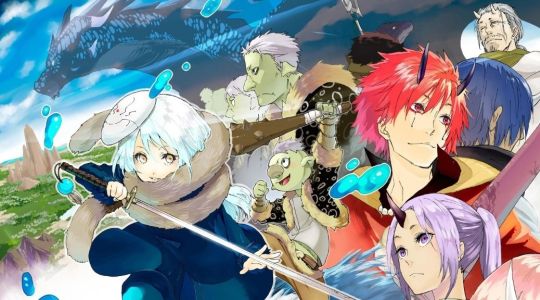
Reincarnation is the idea that a person's significance proceeds after their body passes away, as well as may be reborn into a brand-new one after their life time. The manga focus on the theme of reincarnation, including characters that either have actually been reborn into a brand-new life-cycle, or may be carrying the spirits of previous lives along with having their extremely own personality.
55. X Epoch of Dragon
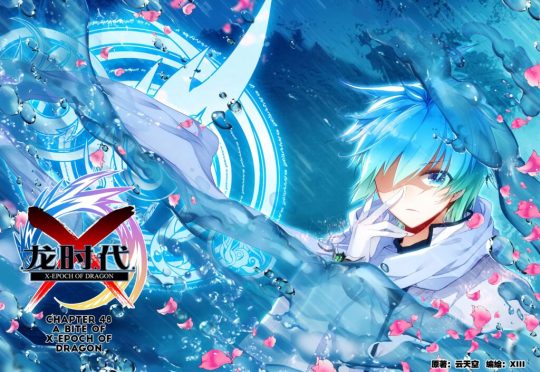
Xin Yun is reincarnated as well as, despite being more powerful, he still appreciates his time with females.
He chooses to grow more powerful to survive later when he is captured up in a battle.
It's a mix of where MC is reincarnated in an additional globe and go back to the past.
Although this manga isn't remarkable if you can keep reading for a couple of chapters you'll remain in for a reward.
The tale?
World-building regardless of its defects, every little thing in this manga is quite different.
It could be just what you are searching for.
54. The Death Mage Who Doesn't Want a Fourth Time
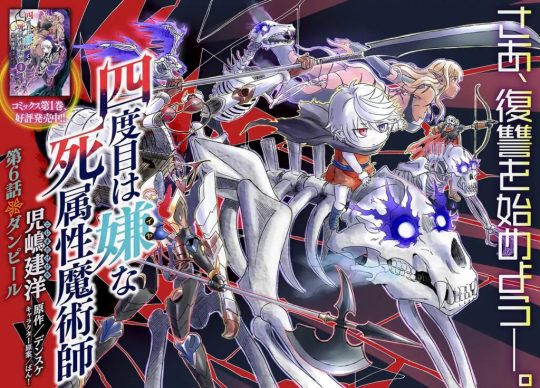
Amamiya Hiroto died saving a girl from a school trip and also the god of rebirth provided him an additional possibility at life,
but in a new globe with mana customers.
He has no other than mana.
This manga is for you if you are tired of uninteresting primary personalities.
It is an isekai manga yet I would certainly say it's the best.
This principle is special it is possible to blend the aspects with no troubles.
53. The Scholar's Reincarnation
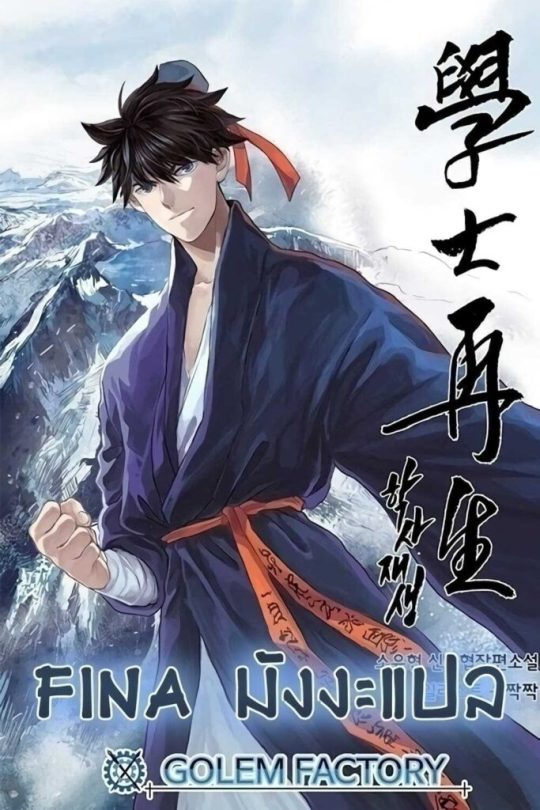
In a self-destruction attack during a battle, a martial musician that had actually eliminated countless individuals was shot to death.
He's now deceased.
Reincarnated right into a caring as well as caring family with a sibling to guard.
What happens if he keeps his memories from the past?
The manhwa's protagonist is Op in a feeling, however the story is light-hearted, and the approach is amusing.
You will not obtain tired though, as the reincarnation/reborn principle works well due to the fact that it mixes all facets.
52. The Twin Siblings' New Life

Arienne Yuriana's twin sibling and also she are born-again as Prince and Princess.
They stay in a dream globe however, instead of living an extravagant life, are entrusted to a violent mother.
They are at some point tossed into an imperial palace and also start to battle.
The first phase offers you an excellent concept of the story.
However, it does obtain a little bit complex between.
Yet, it will eventually pick up once again. The characters will be a joy to you, yet that all relies on how you watch them.
51. Isekai Yakkyoku
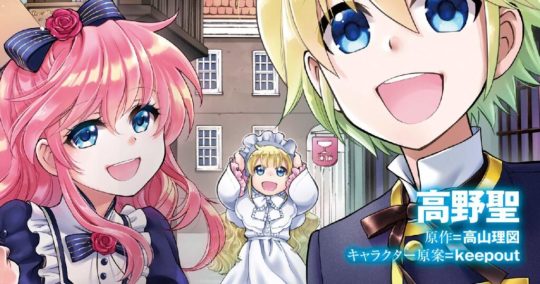
Japan's pharmacologist straining caused the major personality's death at a very early age.
He is currently reincarnated as this middle ages age of Europe.
He's now a 10-year old and the assistant of the Royal Court pharmacologist.
Although it doesn't have an overwhelming major character or a fantastic story, it's a good read.
There are some wonderful minutes, such as using magic to create medicine and other useful points.
50. Soul Land
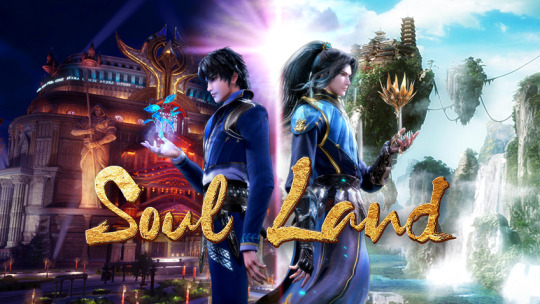
The town was a natural born player of the Tang clan.
He took the clan's prohibited key to acquire the pinnacle of fighting styles.
He needed to end his life and was reincarnated in Soul Land as the most pointless martial spirit.
Initially, the tale and also setup of this manhua was really enticing to me, in addition to the ranking system.
It's a fantastic tale that advances remarkably, and you don't understand just how incredible it will certainly get.
49. Memory Adonis
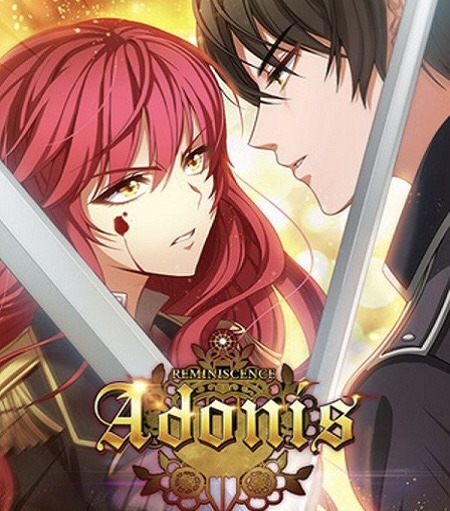
Arhad as well as Ianna's romance finished in tragedy because they were obsessive concerning each various other.
These two are now in a brand-new connection.
Will the catastrophe take place once more?
This manga is a must-read if you like mangas with a female protagonist that is OP.
The use of dream aspects is ideal, although the story might seem average.
While the activity is a time-consuming activity, the very best component of the manga is the narration.
48. Ascendance of a Bookworm
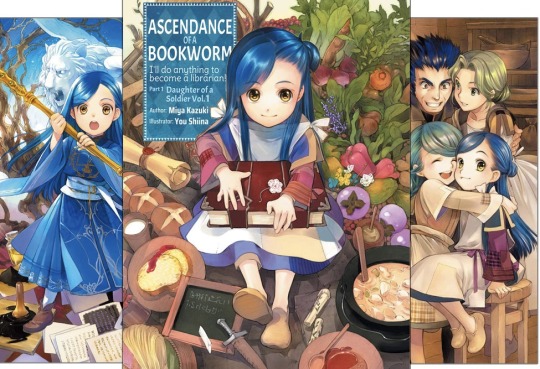
An university lady crazy with books dies as well as reincarnates in a nonliterate world.
Even worse, she can not manage to buy a publication.
She decides to write her own book you can end up being a curator.
This manga is special.
It has plenty of lovely characters as well as a heartfelt tale.
You can check out a reincarnation manga if you have the money.
This is a Slice of life anime Add this to your list.
47. Descent of the Demon Master

Jinho Kang was an average young adult until he was harmed in a crash that caused him to shed every little thing.
China's middle ages age.
In this life, he comes to be the satanic force master, and also later, in the previous life, he can reclaim his capacities.
He wishes to be typical as well as live a regular existence, however beasts prowl in the contemporary world as well as he is the only one that can quit them.
It isn't your average manhwa, since it uses a funny path rather than a complete action motif.
It's a refreshing break from the action-packed reincarnation manga that you've read.
46. Yakuza Reincarnation

A previous yakuza participant with an excellent job in the underground obtains caught up in a trap as well as ends his life.
Remarkably, the catch is in fact his.
As a princess, she was reincarnated into a brand-new world.
Yet still with the old yakuza behavior that does not care about the human values.
This manga's main personality is the marketing point.
It additionally reveals you how the yakuza functions.
It is an enchanting world with numerous impressive fights.
45. I am The Sorcerer King
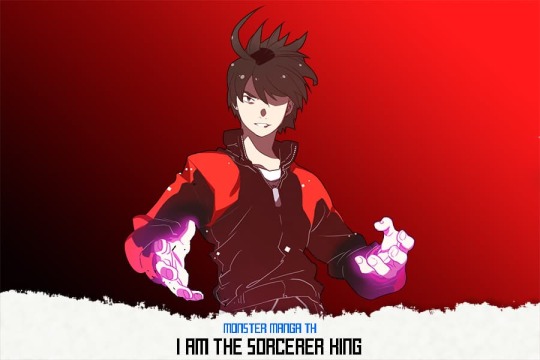
Sung Hoon is utilized as bait in dungeon raids to generate income.
When he is hurt by a beast, however, he recalls his previous life.
He was the sorcerer King KratrausIn his former life, an epic tale of a subdued as well as effective MC begins.
This reincarnation manhwa has some impressive magic-based activity scenes.
The tale is well composed as well as the art is excellent.
It is a wonderful reincarnation manga that additionally has an op mc.
44. The Villainess Turns the Hourglass
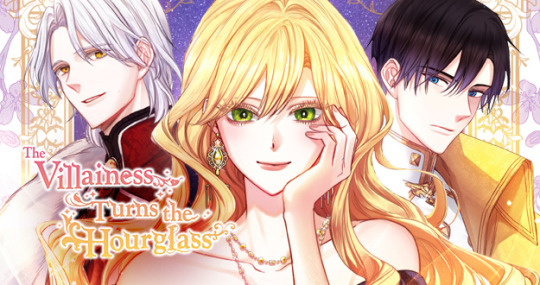
Aria's mommy, a noblewoman, provided her a lush life and bullied her.
Mielle is her step-sister. Eventually, she found out that Mielle had actually tricked and also ruined her reputation.
She will be implemented but travelled back in time with the help of a shapely as well as is now ready to take down Mielle as a Villainess.
This is not a reincarnation, however a principle where the primary character comes to be a villainess.
The villain is really the major personality, as she can do anything you want.
However she's OP and if you consider the story from a various angle, you'll appreciate it.
43. Volcanic Age
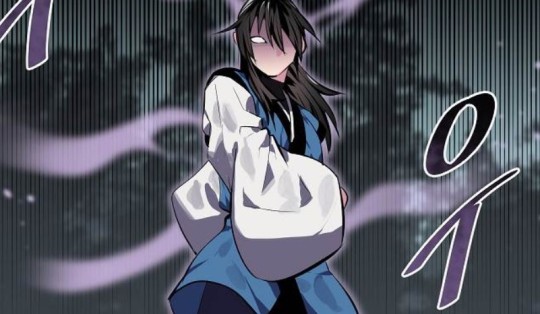
The tale continues Joo Seo Cheon? World Elder of Mount Hua Sect Who dies at 77 He is amazed to locate himself in the past.
He remembers his master's death in 5 years and looks for a treatment.
You can give it to a person you respect.
It is a distinct story that hooks you from the beginning, unlike various other manhuas.
42. Medical professional Elise: The Royal Lady with the Lamp
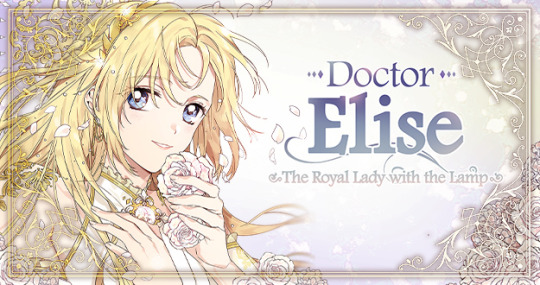
Dr Song She is the youngest and also most talented teacher at a prestigious university in Korea.
Nevertheless, she was when a princess. She gets up again as Princess Elise right before she passes away.
She has the medical expertise to attempt and conserve people she didn't understand in her past life.
Is she most likely to experience the same destiny?
There are few manga/manhwa that has therapist principles.
Best manhwa in which MC is reincarnated into a princess but, it is still used for recovery functions.
You're concerning to see an incredible reincarnation site toon, with terrific artwork and a typical story.
Being a player, he likes to stay in this new world however is it mosting likely to be that very easy?
It is your normal isekai manga where MC obtains carried right into a various globe filled with magic.
However, this manga takes a different path in carrying out every aspect, as well as certainly it was successful in doing so.
It is a light-hearted reincarnation manga with op mc, and also people that are looking for a relaxing manga will certainly like this one.
41. The Story of a Low Rank Soldier Becoming a Monarch
At 15 years of age, the primary personality shed his appropriate arm on the field of battle.
By the time he was 24, he had actually mastered the skills needed to make it through.
He was currently 39 years old as well as functioning as a mercenary to secure sellers.
Everybody was assaulted by artefact-wielding individuals throughout that journey.
After ingesting the artefact, he dealt with alongside their leader and lost his various other hand.
He diminishes the cliff, and also after his fatality, he is reborn at the same time he began his trip as a soldier.
It's a good reincarnation manhwa. It's worth checking out.
40. Villainess Level 99: I Maybe the Hidden Boss But I'm Not the Demon Lord

The manga's lead character is how it was reincarnated in an RPG game as "Villainess Eumiella."
She was originally a side character, yet she comes to be a powerful character later.
Every person fears her like a demon king.
It is not action-packed, however it is still entertaining. a fun reincarnation manga with op mc, and impressive action programs.
This manga features a main personality who is reincarnated into a bad guy.
Despite all the adverse testimonials and also applauds, Eumiella is an exceptional character you'll be surprised at the outcomes.
The main character was a hero who defeated the heretic cult which drove the murim world to destruction.
39. Past Life of the Thunder God
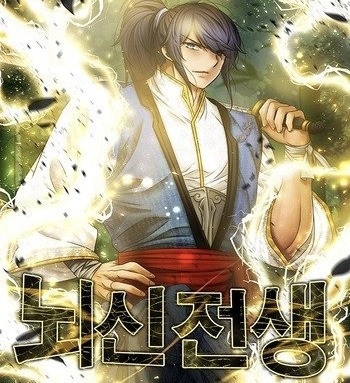
He was betrayed by seven emperors who were afraid of his strength and didn't want him to be a hero.
He died after 30 years and was reborn in Byek Gong's body.
His meridians had been crippled.
He was able to find his enemies and resurrect them.
Now he embarks on his quest for revenge. It is a great reincarnation manga, but it moves very fast so be aware.
38. Infinite Level Up in Murim
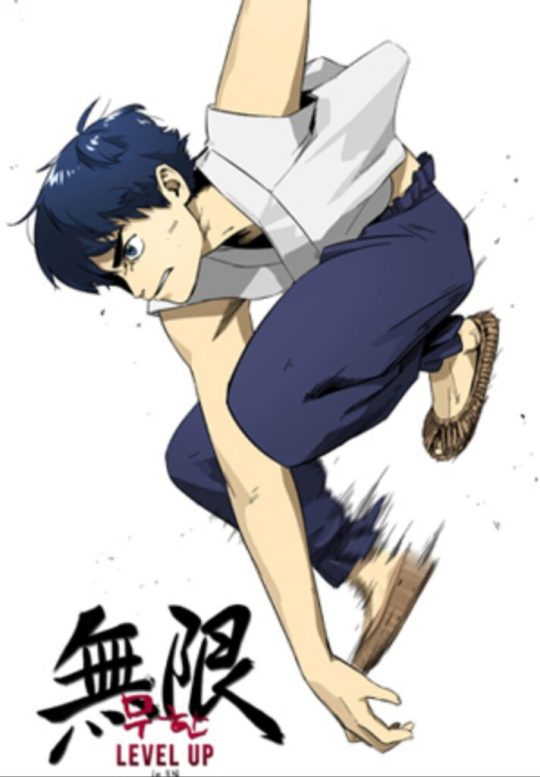
This reincarnation manhwa's protagonist died while protecting his employee on the battlefield.
To find out that he and his men were used as their seals to escape, he died without regrets, even after learning that.
He wakes up after death and discovers that he was brought back to the time he was in his childhood.
Also, he discovers a system to help him get stronger after waking up.
He now has his memories and a system that helps him to get stronger.
37. Tales of Demons and Gods
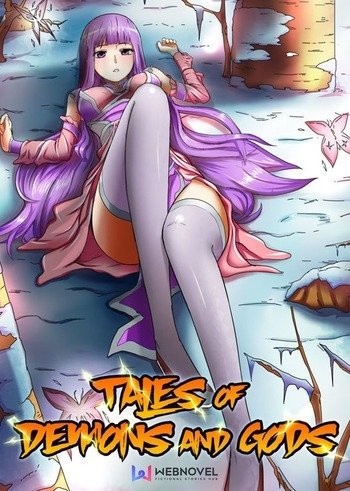
Nie Li was offered a second chance at life after he was a Sage Emperor to be reborn as a 13-year-old child.
He's armed with the knowledge and skills from his previous lives and is ready to fight Sage Emperor again.
This reincarnation manga is not well-known because it has very few details.
The story is amazing world-building is impossible.
This is the manhua/manga for you if you are looking for a manhua/manga in which MC is reborn with superpowers.
36. Devouring Realm
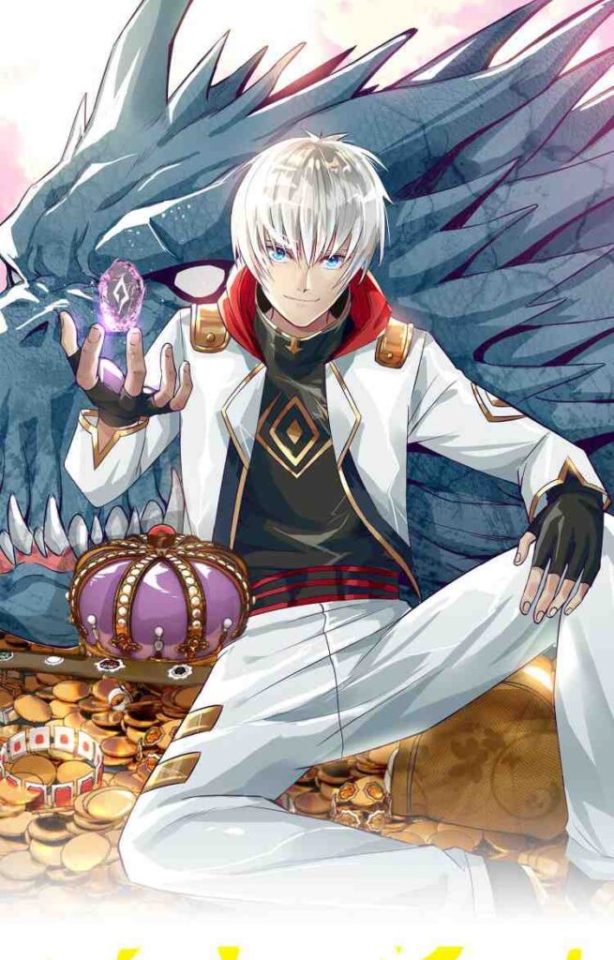
Once upon a time, a king left a sacred item on a vast continent.
It was a powerful item that could be taken by anyone to make them the most powerful in the world.
The item gave the user the ability to copy other people's skills.
It was discovered by the protagonist and his team, but they were then all ambushed and shot.
After losing his team, the main character decided to kill himself after destroying the stone.
He found himself back at the moment when it all began.
After his death, he also found a stone to bring back with him.
With his memories and ability to copy, he decides that he will protect everyone in the second life.
35. Deliverance of the Counterattack
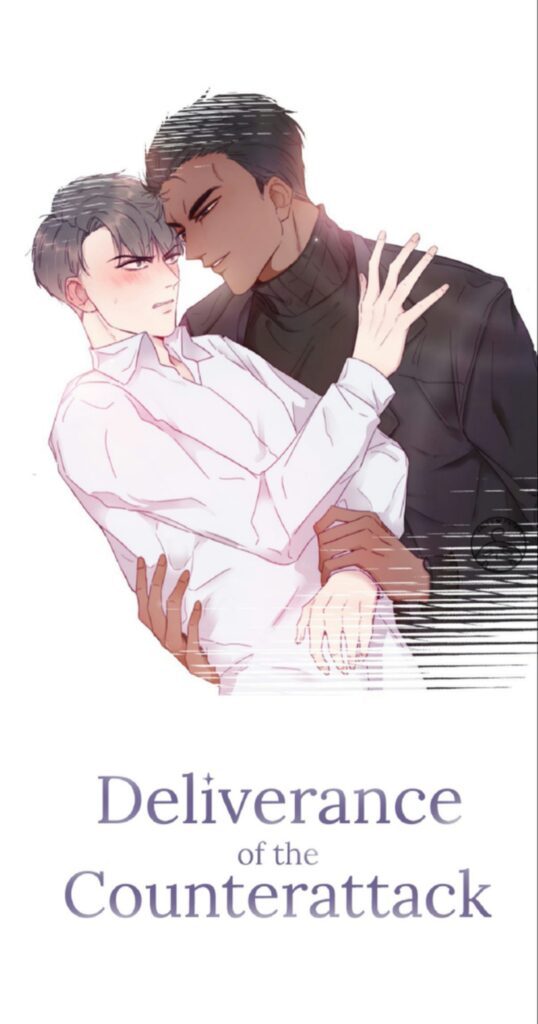
Xu Ci Nian's boyfriend framed him and reincarnated him as his younger sister.
When he realizes this, he vows to get revenge, even if that means joining a mafia gang.
This manhua is a BL but does not think that it will be romantic.
It's a comedy.
34. The Reborn
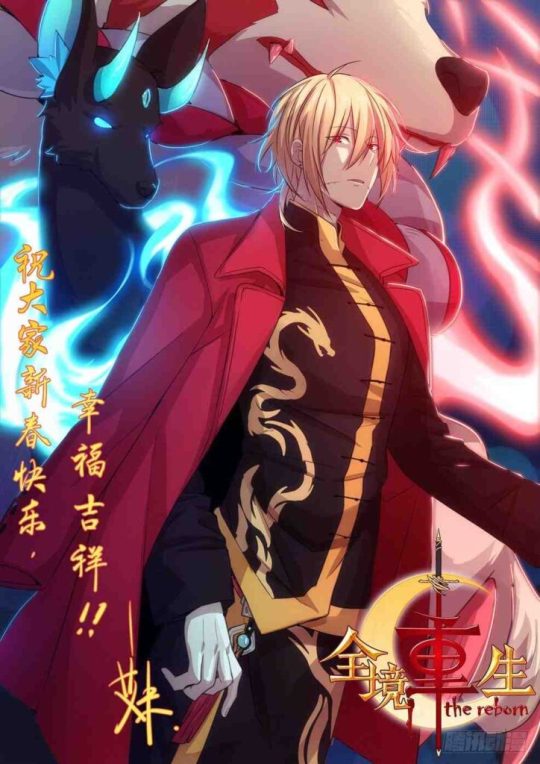
An ancient kingdom, Laham, was decimated on a faraway continent.
Zeluo, the protagonist of that war, died in another country.
His body was reduced to bone and ashes. Zeluo, however, woke up through mysterious magic and was reborn with all his memories and emotions.
He was constantly urged by voices and hallucinations in his mind to go back to Laham, his home country.
He was determined to get his original self back, and he embarked on a treacherous and long journey to do so.
Although this manga has been updated for many months, it is still a great one with reincarnation.
33. Chronicles of Heavenly Demon
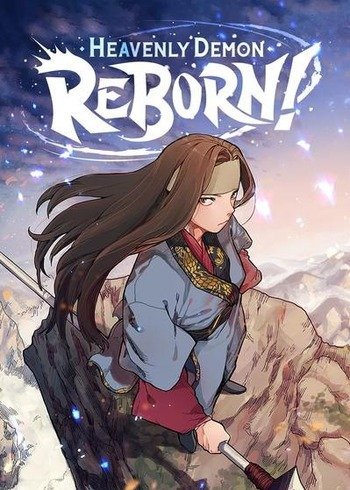
Hyuk Woon Seong is an apprentice of the successor to the spear Master Sect
He was framed to learn Demonic arts and was killed by his clanmates with his master.
He is reborn in Heavenly Demon culture vows to revenge those who have betrayed him.
This manhwa's amazing execution of the story is far too underrated, in my opinion.
This book is a mixture of martial arts and the reborn concept.
It will be a fascinating read. This book is a must-read.
32. I Will Die Soon
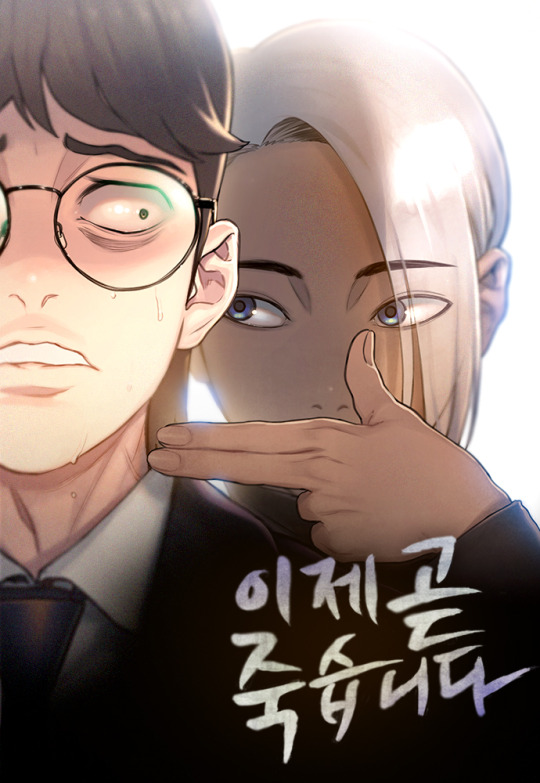
This is an interesting reincarnation manhwa.
The main character was rejected by all those around him and was therefore a loser. He decided to kill himself because of this.
His soul was taken by a god of death after he died. He is told by the woman that she will send his soul to 13 people who will soon die.
He will need to live in that body.
If he survives, he can continue living the life he has lived.
But if he does not, his punishment will be more severe than death.
This story is a collection of life stories from different people. I guarantee you will love it.
31. SSS-Class Suicide Hunter

Kim Gong-jaHe wants to acquire an S-Rank skill but he is still an F-rank hunter.
He did finally get the skill he was looking for, but at what price?
Only a person who dies can use the skill. What's the point in getting an S-rank skill if you're going to die?
It would be more appropriate to call it a reincarnation manga/manhwa than it is to call it. multi-reincarnation concept.
This manhwa is exceptional, and you will love it if you like manhwas such as solo levelling or similar.
Also read : manga / manhwa like solo leveling
30.
Read the full article
0 notes
Text
Events 12.13
1294 – Saint Celestine V resigns the papacy after only five months to return to his previous life as an ascetic hermit.
1545 – The Council of Trent begins as the embodiment of the Counter-Reformation.
1577 – Sir Francis Drake sets sail from Plymouth, England, on his round-the-world voyage.
1623 – The Plymouth Colony establishes the system of trial by 12-men jury in the American colonies.
1636 – The Massachusetts Bay Colony organizes three militia regiments to defend the colony against the Pequot Indians, a date now considered the founding of the National Guard of the United States.
1642 – Abel Tasman is the first recorded European to sight New Zealand.
1643 – English Civil War: The Battle of Alton takes place in Hampshire.
1758 – The English transport ship Duke William sinks in the North Atlantic, killing over 360 people.
1769 – Dartmouth College is founded by the Reverend Eleazar Wheelock, with a royal charter from King George III, on land donated by Royal governor John Wentworth.
1818 – Cyril VI of Constantinople resigns from his position as Ecumenical Patriarch under pressure from the Ottoman Empire.
1862 – American Civil War: At the Battle of Fredericksburg, Confederate General Robert E. Lee defeats Union Major General Ambrose Burnside.[
1867 – A Fenian bomb explodes in Clerkenwell, London, killing 12 people and injuring 50.
1937 – Second Sino-Japanese War: Battle of Nanking: The city of Nanjing, defended by the National Revolutionary Army under the command of General Tang Shengzhi, falls to the Japanese. This is followed by the Nanking Massacre, in which Japanese troops rape and slaughter hundreds of thousands of civilians.
1938 – The Holocaust: The Neuengamme concentration camp opens in the Bergedorf district of Hamburg, Germany.
1939 – The Battle of the River Plate is fought off the coast of Uruguay; the first naval battle of World War II. The Kriegsmarine's Deutschland-class cruiser (pocket battleship) Admiral Graf Spee engages with three Royal Navy cruisers: HMS Ajax, HMNZS Achilles and HMS Exeter.
1943 – World War II: The Massacre of Kalavryta by German occupying forces in Greece.
1949 – The Knesset votes to move the capital of Israel from Tel Aviv to Jerusalem.
1957 – The Mw 6.5 Farsinaj earthquake strikes Iran with a maximum Mercalli intensity of VII, causing at least 1,119 deaths and damaging over 5,000 homes.
1959 – Archbishop Makarios III becomes the first President of Cyprus.
1960 – While Emperor Haile Selassie of Ethiopia visits Brazil, his Imperial Bodyguard seizes the capital and proclaims him deposed and his son, Crown Prince Asfa Wossen, Emperor.
1962 – NASA launches Relay 1, the first active repeater communications satellite in orbit.
1967 – Constantine II of Greece attempts an unsuccessful counter-coup against the Regime of the Colonels.
1968 – Brazilian President Artur da Costa e Silva issues AI-5 (Institutional Act No. 5), enabling government by decree and suspending habeas corpus.
1972 – Apollo program: Eugene Cernan and Harrison Schmitt begin the third and final extra-vehicular activity (EVA) or "Moonwalk" of Apollo 17. To date they are the last humans to set foot on the Moon.
1974 – Malta becomes a republic within the Commonwealth of Nations.
1974 – In the Vietnam War, the North Vietnamese forces launch their 1975 Spring Offensive (to 30 April 1975), which results in the final capitulation of South Vietnam.
1977 – Air Indiana Flight 216 crashes near Evansville Regional Airport, killing 29, including the University of Evansville basketball team, support staff, and boosters of the team.
1981 – General Wojciech Jaruzelski declares martial law in Poland, largely due to the actions by Solidarity.
1982 – The 6.0 Ms North Yemen earthquake shakes southwestern Yemen with a maximum Mercalli intensity of VIII (Severe), killing 2,800, and injuring 1,500.
1988 – PLO Chairman Yasser Arafat gives a speech at a UN General Assembly meeting in Geneva, Switzerland, after United States authorities refused to grant him a visa to visit UN headquarters in New York.
1989 – The Troubles: Attack on Derryard checkpoint: The Provisional Irish Republican Army launches an attack on a British Army temporary vehicle checkpoint near Rosslea, Northern Ireland. Two British soldiers are killed and two others are wounded.
1994 – Flagship Airlines Flight 3379 crashes in Morrisville, North Carolina, near Raleigh–Durham International Airport, killing 15.
1995 – Banat Air Flight 166 crashes in Sommacampagna near Verona Villafranca Airport in Verona, Italy, killing 49.
2001 – Sansad Bhavan, the building housing the Indian Parliament, is attacked by terrorists. Twelve people are killed, including the terrorists.
2002 – European Union enlargement: The EU announces that Cyprus, the Czech Republic, Estonia, Hungary, Latvia, Lithuania, Malta, Poland, Slovakia, and Slovenia will become members on May 1, 2004.
2003 – Iraq War: Operation Red Dawn: Former Iraqi President Saddam Hussein is captured near his home town of Tikrit.
2007 – The Treaty of Lisbon is signed by the EU member states to amend both the Treaty of Rome and the Maastricht Treaty which together form the constitutional basis of the EU. The Treaty of Lisbon is effective from 1 December 2009.
0 notes
Text
Chapter 30: Sui Zhou is Upset That Tang Fan Wants Him to Marry
Context: Follows directly after Chapter 29. We left off at Sui Zhou bringing Tang Fan home to see his grandmother. Grandmother loves Tang Fan and after the dinner, Sui Zhou is unhappy that Tang Fan is pushing for him to get married. At the end of this chapter, Sui Zhou is called away for business and Tang Fan ends up being taken to the palace by Wang Zhi.
Introduction Post | Masterpost
—
Highlights under the cut
Sui Zhou says this in such a domineering manner that everyone is stunned speechless for a moment, glaring at Sui Zhou.
This is not Tang Fan’s place to say anything. In the first place, he does not have any right to speak out, but this does not hinder him from habitually using the eyes he usually applies on his cases to analyse the personalities of the people before him. Brushing his eyes past them, from the way they talk and act, plenty is revealed.
For example, Sui Zhou’s parents are both honest people, otherwise when Sui Zhou’s sister-in-law Lady Jiao spoke, Sui Zhou’s mother would have spoken out to stop her. And also, taking a look at Sui Zhou’s brother and the way he kept mum, this is actually quite similar to the way Sui Zhou is, but Sui Zhou doesn’t speak because he finds no need to. When he is analysing a case and is required to speak, he always says only as much as is necessary, while Sui Zhou’s brother seems to simply be a man of few words and is quiet out of character and habit.
Tang Fan shakes his head inwardly. He heard Sui Zhou say before that Sui An wanted to take the Imperial Examination, but with this kind of personality, even if he manages to get lucky and is selected, it’s likely that he would not last as an official for long. Which high-ranking official is fond of a subordinate who refuses to speak?
Compared to her husband, Lady Jiao is talkative and knows how to adapt to her situation, but she’s too eager to bring attention to herself. Her elders are both honest people and cannot keep her in check, so she probably does as she wants when she’s at home. No wonder Sui Zhou ended up moving out.
With Sui Zhou’s declaration, Tang Fan can no longer keep silent. Taking a step forward, he puts up both his hands in greeting to Madam Zhou, “I am Tang Fan, courtesy name Run Qing. Madam Zhou you can just call me Run Qing. I am a judge at Shun Tian Prefecture and a good friend of Guang Chuan’s. Today I’ve brought my younger sister Ah Dong to celebrate Madam Zhou’s birthday, I wish Madam Zhou an abundance of fortune and to live a long life.”
Ah Dong greets Madam Zhou obediently as well, “A thousand fortunes for Madam Zhou.”
Then, she brings the present they brought with them to Madam Zhou.
Madam Zhou laughs openly, “Good, good! Since you are close to our family, then there is no need to be too fussy. It’s so rare for my Ah Zhou to bring a friend home and wish me well for my birthday, I can tell that you must be a good child. The young lady looks beautiful and smart, this is good, this is good!”
It is a popular trend in recent years to open gifts in front of everyone as it doesn’t matter if the gift is cheap or expensive, as long as it is well-thought out, the person celebrating their birthday would be happy.
Lady Jiao takes the gift box and pulls at the string over the box, opening it. She sees a Longevity Peach carved out of jade. The colour of the jade is warm and the item is both intricate and cute. The size of a palm, it’s most suited to be played with in one’s hands.
For Madam Zhou’s birthday, the palace also sent some gifts over, but she has been frugal all her life and does not wish to announce it, so her birthday banquet simply involves her daughter’s family and a dinner. Seeing this gift, Madam Zhou is both stunned and flattered, “It’s good enough that you came, why did you splurge on such an expensive gift?”
Tang Fan smiles, “I didn’t spend any money on it. I don’t mind letting Madam Zhou know that my salary is low, if I really was to buy it I wouldn’t be able to afford it. This Longevity Peach is an heirloom passed down in my family, and since my parents and elders are no longer around, I took it out as a gift to give to you, I hope Madam Zhou does not refuse or dislike this gift!”
He may have said this humbly, but just from the colour composition of the jade, Sui Zhou knows that the price of this jade peach is not cheap and it looks like the jade has aged well. To be able to collect and keep something like this, it’s clear that the Tang family was well off.
From this gift, it is enough to see the Tang Fan’s thoughts and well wishes.
Madam Zhou is the Empress Dowager’s sister and the Sui family as seen plenty of powerful officials and wealthy individuals. The Ming dynasty also has a tradition of respecting the elderly, so instances of an old lady yelling at an official on the streets, lambasting them to the extent of carriages carrying officials having to move around the elderly are possible. When Sui Zhou first introduced Tang Fan as a judge from Shun Tian Prefecture, the Sui family was not the slightest bit shocked. After all, Sui Zhou’s father and brother both have titles within the ranks of the Embroidered Uniform Guards.
With this jade longevity peach however, Lady Jiao takes the hint and shuts up.
Madam Zhou is still shaking her head, “Don’t spend so much money the next time! It’s good enough that you are visiting. I’m really happy to see the both of you!”
Tang Fan grins, “That’s where you’re wrong, Madam Zhou. When it comes to your eightieth, ninetieth birthdays in the future, not only will I spend, but I will spend even more! When that time comes, I will find a bigger longevity peach for Madam Zhou!”
Madam Zhou is so tickled by that, that she burst out in laugher, “Such a glib tongue, Run Qing. You’re more than a hundred times sweeter than Ah Zhou and Ah An. It must have difficult for you to be able to be friends with Ah Zhou. If he bullies you, you must tell me, I will support you!”
Listening to this, why does Tang Fan feel as if he’s about to marry Sui Zhou? Then again, he supposes that Madam Zhou is already so old, sometimes she may speak without thinking, and so Tang Fan brushes the comment off with a smile.
Although it is a family banquet, but the dishes on the table were obviously intricately cooked. While the Sui family isn’t fond of words, with Tang Fan around, he manages to entertain Madam Zhou well. Sui Zhou’s sister Sui Bi is older than Ah Dong is by a few years, but the two young ladies become fast friends and shortly after begin to talk in low voices with one another.
In comparison, Sui Zhou’s parents and older brother look to be guests at the table instead. They don’t say much and concentrate on eating from the start to the end. Lady Jiao of course wants to interrupt and say something, but Madam Zhou seems to not be fond of speaking to her. Holding Tang Fan’s hand, she continues to talk to him. Once she hears that Tang Fan’s parents died early and his older sister is married off out of the city, and moreover, Tang Fan has yet to marry, she sighs, “What a poor thing. Being an official in Jing city all on your own, and you don’t even have a soulmate to accompany you at your side no matter what. Someone of your character, I’m guessing the matchmaking ladies must have been dying to step through your doors. What kind of women do you like? Come, tell me, I’ll help you look around!”
Once Tang Fan hears this, his skin goes numb and quickly, he uses Sui Zhou as his shield, “Madam Zhou, I remember that Guang Chuan seems to be older than me by a few years, I’m sure he’s more eager to get married than I am?”
He’s just finished speaking when he feels someone staring at him from the side, obviously unhappy with the way Tang Fan is creating trouble for him by diverting it from himself to Sui Zhou.
“Run Qing has high expectations, don’t randomly connect the red string for him,” Sui Zhou speaks, finally shifting the old woman’s attention from Tang Fan to him.
Madam Zhou is unhappy with what he said, “Nonsense, will you not marry if you have high expectations? It’s no trouble for me to go and find the Empress Dowager and let her pick some, if he doesn’t like a common woman, I’m sure a princess or a royal member will do?”
Tang Fan doesn’t know whether to cry or laugh and is about to stop her, but Lady Jiao sourly half jokes, “Madam Zhou you’re really biased. You haven’t known Run Qing for even half a day and you’re already helping him to find a match, if people didn’t know, they would think you took in another grandson!”
Madam Zhou chuckles, “Run Qing this child and I get along well, so what if I play matchmaker for him? Don’t tell me you want this too? I’m of course more than happy to get Ah An someone from the royal family, but then you’ll have to give up your position, no?”
At that, Lady Jiao becomes silent.
Tang Fan manages to convince Madam Zhou to dismiss the idea for now, and after the meal, Ah Dong and Sui Bi look to be getting along well as well, and so she’s invited to stay for the rest of the day. Tang Fan and Sui Zhou then bid Madam Zhou farewell with the promise of coming to visit her often, and it’s only then they are allowed to leave.
After exiting the house, Tang-daren wipes at his cold sweat, “Guang Chuan, the old lady in your family is really persistent. Luckily I did not give in, otherwise Madam Zhou would really have gone into the palace and asked for a princess from the Empress Dowager for me!”
“Is a princess no good?” asks Sui Zhou.
It sounds as if Sui Zhou is teasing him, but the man’s face is cold as ice, even the way he speaks is cold and without feeling. However, Tang Fan has long gotten used to this poker face of his and does not mind, only shaking his head with a laugh.
Is marrying a princess good or not? All women that exist are precious and treasured despite their status and are naturally good. However, becoming a Prince Consort by marrying a princess, this means he will not be able to participate in politics. Even those who were originally officials will have to quit their roles and go home, but this rule is aimed only at civil officials. For officials in the military, this rule is not enforced as strictly. For example, the Prince Consort Jing Yuan who died protecting the late Emperor during the Tu Mu Fortress Rebellion was also an official and was allowed to lead the army during wars.
However, for civil officials this is a death sentence! After marrying a woman from the royal family, their careers are as good as dead, so men with ambition see marrying women from the royal family as turning their backs on their careers. While Tang Fan does not obsess over his position, but he has after all studied so hard for more than a decade, all to continue on his life’s path to service the people and be able to do something for them.
After their meal, they steadily walk back home in the direction of their house to digest the food they just ate. Their steps are slow and steady, as if they are very relaxed and free.
Tang Fan then teases him, “But Madam Zhou said something right. You’re not young anymore, you should be getting married. Don’t wait a few more years and by then no one will want you.”
Sui Zhou glances at him, “You truly wish for me to get married?”
Without waiting for him to reply, Sui Zhou adds, “If I marry, you will have to move out.”
Tang Fan nods, “That makes sense, after all, we have to prevent tongues from wagging.”
“You’ll have to find a house on your own.”
“Houses in Jing city are really hard to find,” Tang Fan sighs.
“In a few years, when Ah Dong is old enough to marry, you’ll have to cook by yourself again.”
“That makes sense…” Then he considers that again and finds that the prediction is wrong, and adds, “Then I can go find one to marry too, no?”
“And let her find out that you’re writing erotica fiction, and that it’s selling pretty well?”
“…”
“Or maybe you’d like to explore further with her, let her write some, so that she can contribute to the family expenses as well.”
Tang Fan laughs, “It wouldn’t be so bad?”
“Judging from your current salary, aside from your massive food expenses whenever you run out to eat, when Ah Dong marries, you still have to put together a dowry for her and then after you get married, you will need to feed one more person. When you have children, that’s even more mouths to feed.”
The more Tang-daren hears, the greener his face becomes.
Sui Zhou continues to analyse it, “And it’s also likely that you will end up marrying someone like my sister-in-law, if our wife is not virtuous, that is disaster for the family that will end up harming your children and grandchildren.”
“Don’t say anymore,” Tang-daren says weakly, “Marrying a woman is so scary, I think I won’t marry any time soon.”
Sui-baihu makes a noise of assent, his expression stern and firm, obviously having the same thoughts as Tang Fan.
#tsomd#the sleuth of ming dynasty#tsomd novel#成化十四年#fanzhou#fanzhou highlights#tang fan#sui zhou#lmao i lol-ed because#SUI ZHOU IS SO OBVIOUS?!!#he's like pissed#wtf i thought we were boyfriends#you want me to marry someone else?#you sure about that?!!#after i offered you my salary?!!
75 notes
·
View notes